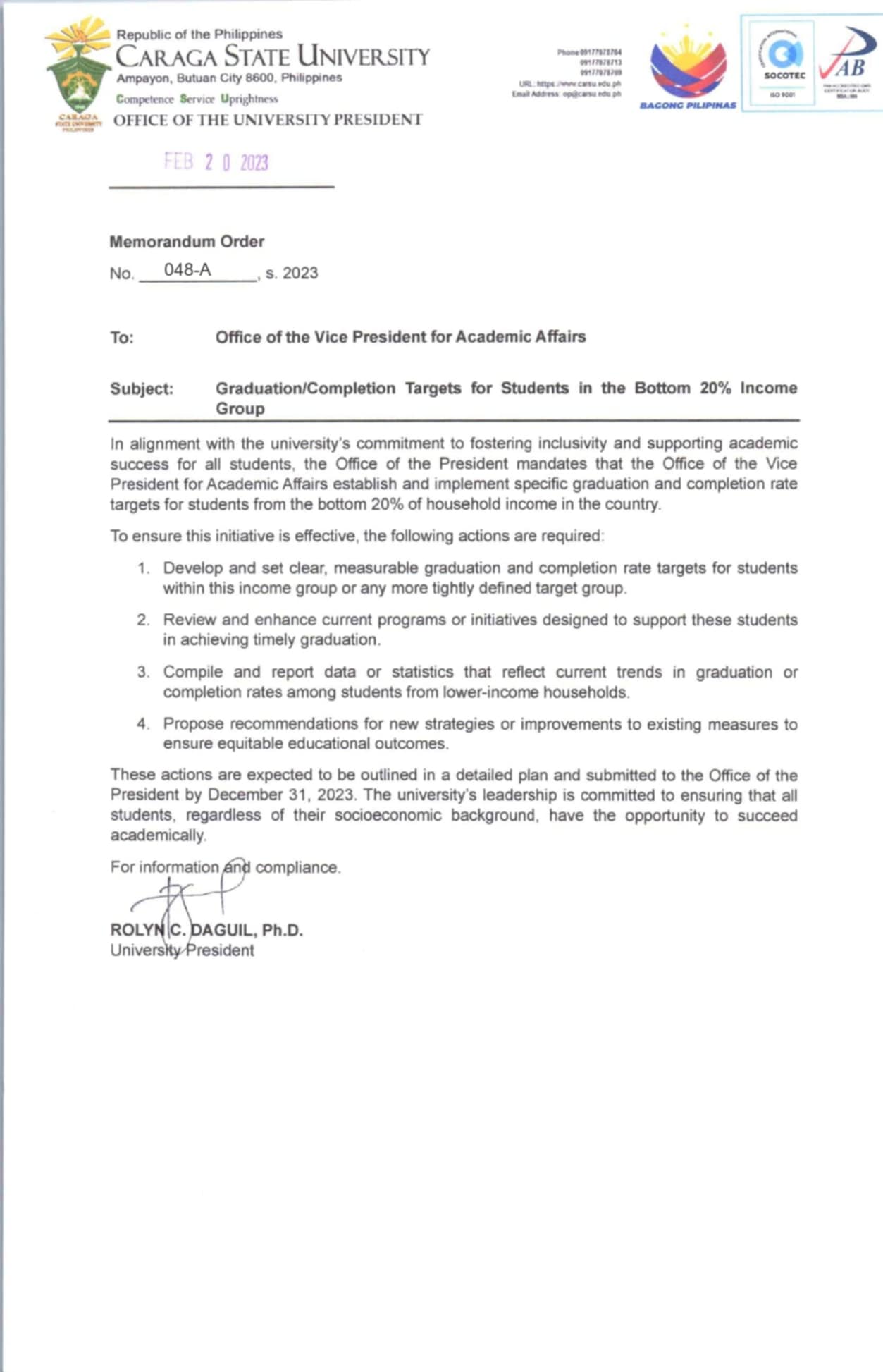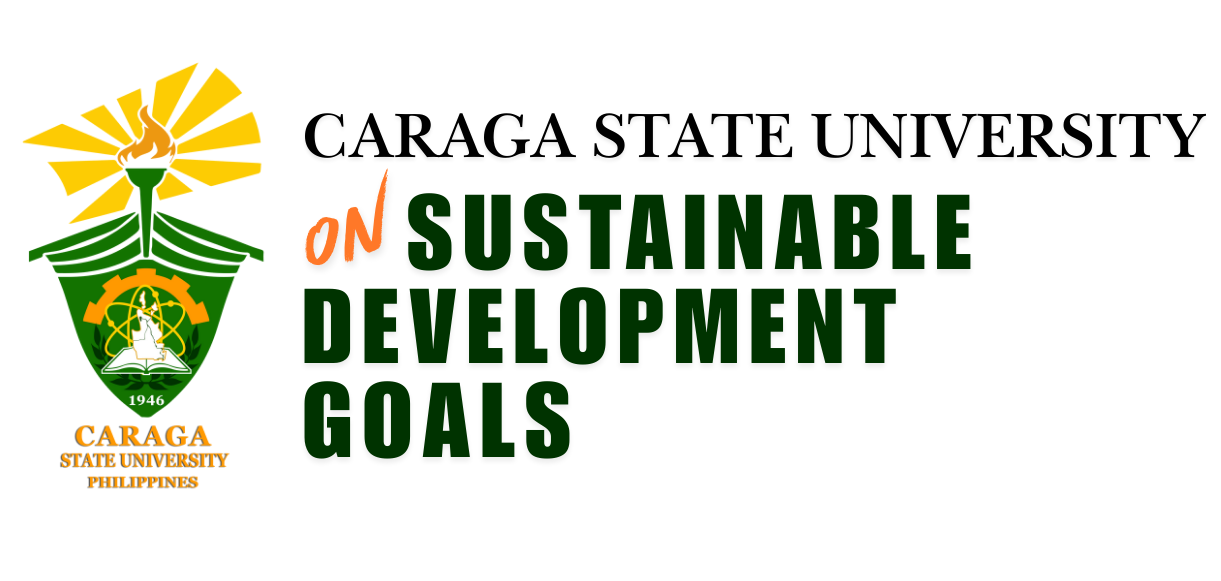Sustainable Development Goal (SDG) 17: Partnerships for the Goals

Overview
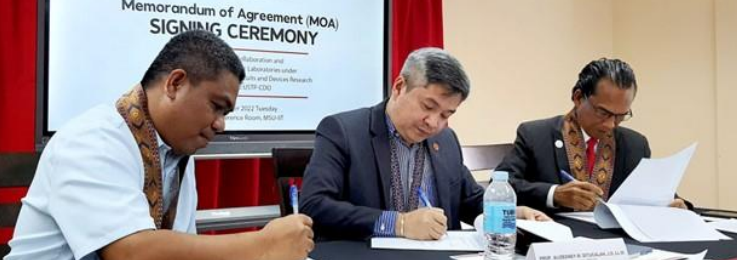
Caraga State University (CSU) is committed to establishing and nurturing strategic alliances that enhance sustainable development efforts across the Caraga region and beyond. By actively engaging with government agencies, industry partners, community organizations, and other educational institutions, CSU strengthens its capacity to address regional and global challenges. These collaborations drive projects that support environmental stewardship, technological innovation, inclusive economic growth, and educational advancements. Through these partnerships, CSU not only maximizes its resources and expertise but also fosters a collective impact, empowering communities and expanding opportunities for meaningful development aligned with the Sustainable Development Goals.
17.2 Relationships to support the goals
17.2.1 Relationships with regional NGOs and government for SDG policy
Caraga State University (CSU) collaborates with regional stakeholders to advance Sustainable Development Goals (SDGs), focusing on socio-economic and environmental progress. Through the Regional Development Council (RDC), CSU has been pivotal in establishing volunteerism as a development strategy, aligning regional investment plans with national priorities, and supporting conservation efforts. As a council member, CSU contributed to volunteerism initiatives under Republic Act No. 9418 and helped develop the Caraga Regional Development Investment Program (RDIP) 2023-2028. Additionally, CSU supports the Project Area Suitability Assessment (PASA) to designate Mt. Mayapay as a protected area. These efforts showcase CSU’s commitment to sustainable development and environmental stewardship in Caraga.
Empowering Community Engagement: Institutionalizing Volunteerism as a Catalyst for Sustainable Development in the Caraga Region
As a member of the Caraga Regional Development Council, the Caraga State University participated in the creation, approval, and implementation of a resolution on the Institutionalization of Volunteerism as a Development Strategy in the Caraga Region.
The resolution formally recognizes volunteerism as a key component of Caraga’s development strategy, highlighting its role in mobilizing community engagement and collective action to address regional needs. Defined under Republic Act No. 9418, the Volunteer Act of 2007, volunteerism is presented as encompassing a range of activities, from traditional mutual aid to structured programs within communities and institutions, driven primarily by altruism rather than financial incentives.
The Philippine National Volunteer Service Coordinating Agency (PNVSCA) advocated for the institutionalization of volunteerism within Caraga, urging the Caraga Regional Development Council (RDC) to make volunteerism an official strategy within its governance framework. This aligns with the Caraga Regional Development Plan (RDP) 2023-2028, which emphasizes social development, reducing vulnerabilities, enhancing security, and promoting good governance. The RDP’s overarching goal is to foster industrialization and innovation in Caraga’s key sectors—fisheries, agro-forestry, mining, and eco-tourism—through a “whole-of-government and whole-of-society” approach. Volunteerism is crucial in achieving these goals by channeling the energy, skills, and dedication of community members and institutional partners toward sustainable, inclusive growth across these sectors.
Universities play a pivotal role in implementing this volunteerism strategy. As centers for education, research, and community outreach, universities are positioned to integrate volunteerism into both academic and extension programs, encouraging students and faculty to contribute directly to regional development efforts. Universities can lead by establishing community-based projects, organizing outreach programs, and partnering with local government units (LGUs) and regional line agencies (RLAs) to address key issues such as education, health, environmental conservation, and disaster preparedness. Through these initiatives, universities provide practical learning experiences for students and contribute valuable expertise to the community, addressing challenges with research-driven solutions and innovations.
The resolution, approved by the RDC’s Social Development Committee (SDC) on November 16, 2023, and further endorsed by the Caraga RDC in a full council meeting on November 29, 2023, reflects a strong commitment to embedding volunteerism in Caraga’s development approach. With this endorsement, LGUs, RLAs, universities, colleges, and other stakeholders are encouraged to work together to implement volunteer-driven initiatives that address local needs and foster resilience.
Sources:
Membership in the Regional Development Councils and Committees
Strategic Planning for Sustainable Growth: Guidelines for the Caraga Regional Development Investment Program (RDIP) 2023-2028
As a Caraga Regional Development Council member, Caraga State University participated in the creation of Resolution No. 73, Series of 2022, which approves the Guidelines for the Preparation of the Caraga Regional Development Investment Program (RDIP) 2023-2028. This resolution aligns Caraga’s development initiatives with national guidelines from NEDA, DBM, and DOF, establishing criteria for selecting and prioritizing programs and projects (PAPs) within the RDIP. The guidelines direct Agency Regional Offices (AROs), State Universities and Colleges (SUCs), Government-Owned and Controlled Corporations (GOCCs), and other stakeholders to align their investment planning efforts with the region’s overarching goals of sustainable growth and socio-economic development.
Universities, particularly SUCs, play a critical role in the RDIP by contributing through educational programs, research, and community outreach initiatives that support regional development priorities. Their involvement ensures that academic resources and expertise are integrated into strategic projects, helping address key areas such as infrastructure, innovation, and capacity building in Caraga. Through collaboration with other agencies, universities help bridge knowledge and skills gaps, fostering sustainable progress aligned with Caraga’s long-term objectives. The resolution underscores the importance of these institutions in advancing the region’s development agenda through active participation in planning and implementing priority projects.
Collaborating for Caraga’s Future: Caraga State University’s Role in the Regional Development Plan 2023-2028 Launch
Caraga State University (CSU) actively participated in the launch of the Caraga Regional Development Plan (RDP) 2023-2028 on August 9, 2023, at the LMX Convention Center in Butuan City. This event, led by the Caraga Regional Development Council (RDC), gathered stakeholders from government, private sectors, NGOs, the academe, and youth to commit to advancing the region’s economic growth and sustainability goals.
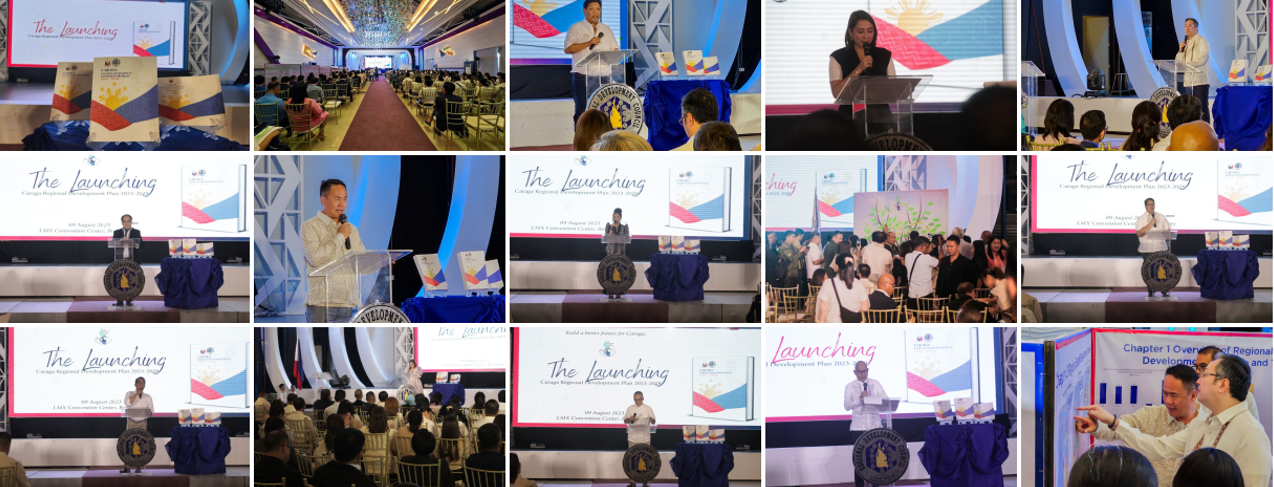
CSU President Rolyn C. Daguil was among the sectoral representatives expressing support for the RDP. His involvement underscored CSU’s dedication to regional development, especially through its role in innovation, research, and community engagement—key areas essential for realizing the RDP’s vision of elevating the fishery, agro-forestry, mineral, and ecotourism (FAME) sectors through industrialization.
The event included an audio-visual presentation of the RDP’s key features, a Gallery Walk led by NEDA and RDC officials to facilitate understanding and discussions on the Plan, and concluded with a Wall of Commitment where CSU and other stakeholders symbolically pledged to support the RDP’s initiatives.
CSU’s role in the event exemplifies collaboration for SDG 17: fostering partnerships among public institutions, academia, and the community to collectively drive sustainable growth and innovation within Caraga, directly contributing to the Philippines’ long-term vision of inclusive and sustainable development.
Sources:
Caraganons pledge support for Region’s goals toward transformation
https://nro13.neda.gov.ph/caraganons-pledge-support-for-regions-goals-toward-transformation/
Preserving Mt. Mayapay: A Collaborative Project Area Suitability Assessment for Ecological Protection
The Sangguniang Panlungsod of Butuan City, led by Vice Mayor Lawrence Fortun, has approved SP Resolution No. 334-2022. This resolution allows the Butuan City government, under Mayor Ronnie Vicente Lagnada, to sign a Memorandum of Agreement (MOA) with various stakeholders, including the Provincial Government of Agusan del Norte, Municipal Government of Buenavista, Department of Environment and Natural Resources-Regional Office 13 (DENR-13), National Commission on Indigenous Peoples (NCIP), Butuan Global Forum, Caraga State University (CSU), Central Mindanao University (CMU), and Father Saturnino Urios University (FSUU).
The purpose of the MOA is to conduct a Project Area Suitability Assessment (PASA) for Mt. Mayapay, with the goal of having it declared as a protected area under the Expanded National Integrated Protected Areas System (NIPAS) Act of 2018.
This initiative supports House Bill No. 2267, authored and sponsored by Vice Mayor Fortun, which aims to protect Mt. Mayapay’s ecological balance, biodiversity, and life support systems, ensuring sustainable resources and maintaining its natural condition.
CSU and other partners play a key role by contributing technical expertise to help successfully implement the PASA for Mt. Mayapay. This action is vital for conserving and protecting the area’s biodiversity and ecological processes.
The resolution also highlights the commitment of City Councilor Victor Plaza and the support of various parties to ensure the success of the PASA process, with the Butuan City government funding the initiative.
Source:
17.2.2 Cross-sectoral Dialogue about SDGs
This cross-sectoral dialogue gathers diverse voices committed to advancing the Sustainable Development Goals (SDGs) through collaborative efforts across government, NGOs, academia, and local communities. From reforestation efforts through the “One Million Trees” program to gender-focused empowerment initiatives like Navigatu, these events amplify inclusive, sustainable development.
Engaging in climate security and environmental peacebuilding in Mindanao, stakeholders foster a community of practice focused on resilience. The region’s agricultural sector benefits from the Agri-Aqua Innovation Pitch Fest, while the Caraga Food Innovation Center drives economic growth by supporting local products through Buy Caraga By Caraga 2023. Additionally, research on Indigenous People’s well-being and poverty, funded by DOST XI-NRCP, spotlights community-led paths out of poverty.
Caraga State University strengthens partnerships and innovation through international conferences, focusing on sustainable mining practices showcased at Mining Philippines 2023, and health-focused events like Caraga Healthcon 2023. This dialogue celebrates the alignment of these initiatives with SDGs, aiming for a future defined by resilience, equity, and innovation.
17.2.2.1 Events involving government & NGO PARTNERS
The events involving government and NGO partners in Caraga and Mindanao have played a crucial role in advancing the Sustainable Development Goals (SDGs) by fostering collaboration, addressing pressing issues, and creating impactful solutions for the region:
Greening Caraga: A Collaborative Initiative to Grow One Million Trees for Environmental Conservation
On January 13, 2023, the Commission on Higher Education – Caraga Regional Office (CHED Caraga) hosted the ceremonial signing of a Memorandum of Agreement (MOA) with the Department of Environment and Natural Resources Caraga Regional Office (DENR Caraga) and Caraga higher education institutions (HEIs) to advance the Growing One Million Trees Advocacy Program. CHED Caraga’s initiative aims to contribute to the region’s environmental conservation efforts and sustainable land management.
Held at Caraga State University (CSU), the event was attended by DENR Caraga Regional Executive Director Nonito Tamayo, other DENR officials, university presidents, representatives from state universities and private HEIs, and CHED Caraga personnel. Director Tamayo affirmed DENR’s commitment to provide resources for the program, including National Greening Program (NGP) sites, emphasizing the critical role of collaboration: “To improve and beautify Caraga, DENR cannot do this alone. We need CHED and the HEIs.”
This partnership aligns with the United Nations Sustainable Development Goals (SDGs), specifically SDG 13 (Climate Action) and SDG 15 (Life on Land). Through reforestation and tree-planting efforts, the program aims to combat climate change impacts, restore degraded land, and promote biodiversity conservation, supporting SDG 15’s focus on sustainable land ecosystems. The program also fosters environmental awareness and stewardship by engaging educational institutions, instilling a sense of responsibility in students and local communities to care for the environment.
Source: https://chedcaraga.ph/wp-content/uploads/2023/07/2023-AR-Q1.pdf

Empowering Women Entrepreneurs: Navigatu’s Training for Inclusive Innovation and Social Impact
Navigatu, a leading innovation hub, conducted a two-day training program for 16 women-led Micro, Small, and Medium Enterprises (MSMEs) on June 9-10, 2023, as part of the DOST Women Helping Women: Innovating Social Enterprise (WHWise) National Innovation Challenge. Led by Prof. Melbert R. Bonotan, Navigatu TBI Director, and Ms. Jenelyn B. Refamonte-Asis, Incubation Project Head, the training offered critical insights into market-pull innovation, human-centered design, the value proposition canvas, product development strategies, and social innovation geared towards inclusive business and social impact.
This initiative supports several United Nations Sustainable Development Goals (SDGs), notably SDG 5 (Gender Equality), SDG 8 (Decent Work and Economic Growth), and SDG 9 (Industry, Innovation, and Infrastructure). By empowering women entrepreneurs with practical business skills and innovative strategies, the program directly advances SDG 5 by promoting gender equality and enhancing women’s economic empowerment. The focus on equipping MSMEs with competitive business knowledge also supports SDG 8, fostering sustainable economic growth and resilient small businesses that contribute to local economies.
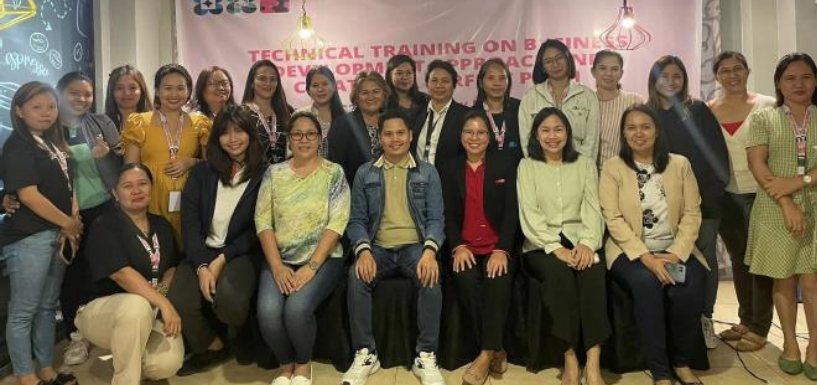
Furthermore, by emphasizing social innovation and human-centered design, Navigatu’s training aligns with SDG 9 by encouraging the creation of inclusive business models that support sustainable industry practices. Through these efforts, Navigatu is not only enabling women-led MSMEs to thrive but also fostering a culture of social responsibility and sustainable business development within the region.
17.2.2.1 Conferences bringing together government, NGO voices
The Caraga State University hosted the Climate Security and Environmental Peacebuilding Workshop from October 24–26, 2024, which brought together a wide range of experts and stakeholders from government, academia, international organizations, NGOs, and local communities to address the intersections of climate resilience, peace, and security in the region. Co-hosted by Mindanao State University – Iligan Institute of Technology, Caraga State University, Agusan Del Sur State University College of Agriculture and Technology, ECOWEB, CGIAR’s Climate Resilience Initiative (ClimBeR), and CGIAR’s Initiative on Fragility, Conflict, and Migration (FCM), the workshop served as a platform to explore the connections between environmental sustainability and peacebuilding in the conflict-sensitive context of Mindanao.
During the event, participants engaged in discussions and collaborative sessions to identify specific climate-related challenges that intensify local conflicts, such as resource competition, land management issues, and environmental degradation. Recognizing these as key conflict drivers, they worked to define entry points where climate adaptation and natural resource management could contribute to peacebuilding.


The workshop culminated in the launch of the Community of Practice (CoP) for Environmental Peacebuilding and Climate Security in Mindanao. This CoP aims to sustain collaboration across institutions to address climate security and peacebuilding through four key areas:
- Generating Knowledge and Evidence on climate-related conflicts in Mindanao.
- Fostering Inter-Institutional Collaboration to secure funding and implement climate resilience projects.
- Supporting Policy Development to integrate climate and environmental considerations into security measures.
- Promoting Learning and Innovation within Mindanao’s educational system through updated curricula on climate security and environmental peace.
The workshop laid a foundation for sustained partnerships and innovative solutions to address both the environmental and socio-political complexities in Mindanao, aiming to advance peace and resilience in the region.
Source: https://www.cgiar.org
Agri-Aqua Innovation Pitch Fest
The Technology Transfer and Licensing Office (TTLO) team’s participation in the Agri-Aqua Innovation Pitch Fest aligns with several Sustainable Development Goals (SDGs), notably SDG 9 (Industry, Innovation, and Infrastructure), SDG 8 (Decent Work and Economic Growth), and SDG 2 (Zero Hunger). Held from December 5 to 7, 2022, at Acacia Hotel Manila in Alabang, Muntinlupa City, this pitch fest served as the culmination of a series of training sessions organized by the Agricultural Productivity Project (APP). Funded by DOST-PCAARRD, APP focuses on advancing technology commercialization and intellectual property protection, facilitating agricultural and aquaculture sector growth through innovation.
The event showcased cutting-edge technologies and innovations addressing key challenges in agriculture and aquaculture, supporting SDG 9 by promoting sustainable industry practices and encouraging the adoption of new technologies. This platform connected researchers and innovators with investors, partners, and adopters, supporting SDG 8 by fostering economic growth, creating job opportunities, and enhancing local industries through technology-driven solutions.
Moreover, the TTLO’s role in bridging research and industry contributes to SDG 2, as many of the showcased innovations are designed to enhance agricultural productivity and food security. By facilitating technology transfer and commercialization, the TTLO supports sustainable practices that can improve productivity, reduce waste, and contribute to a more resilient and sustainable agricultural sector. Through events like these, the TTLO underscores its commitment to driving innovation and sustainable growth within vital economic sectors.

Well-Being, Realizations, and Aspirations of the Indigenous People’s Students from Poverty-Stricken Families in Caraga Region | Funded by DOST XI -NRCP
This three-day training workshop aligns closely with several Sustainable Development Goals (SDGs), particularly SDG 4 (Quality Education), SDG 10 (Reduced Inequalities), and SDG 17 (Partnerships for the Goals). By enhancing participants’ skills in data organization, summarization, and interpretation, the workshop directly contributed to SDG 4 by empowering researchers with quality educational tools that support effective, data-driven decision-making in their work.
The workshop also prioritized inclusivity, as it involved 30 tribal community members and fostered skills that support equitable participation in research—an important step towards reducing inequalities (SDG 10) within academic and research fields. The event’s collaborative environment, facilitated by esteemed speakers from Caraga State University’s College of Education, encouraged a sharing of knowledge that benefited participants from diverse backgrounds, thus strengthening their capacity to contribute meaningfully to the development of their communities.
Additionally, the workshop promoted SDG 17 by fostering a sense of partnership and cooperation among participants, cultivating networks that may support future collaborative research. The practical skills and collaborative spirit cultivated in this workshop ultimately contribute to enhancing the aspirations and educational opportunities of Indigenous People’s students, addressing educational and economic disparities within the Caraga Region.
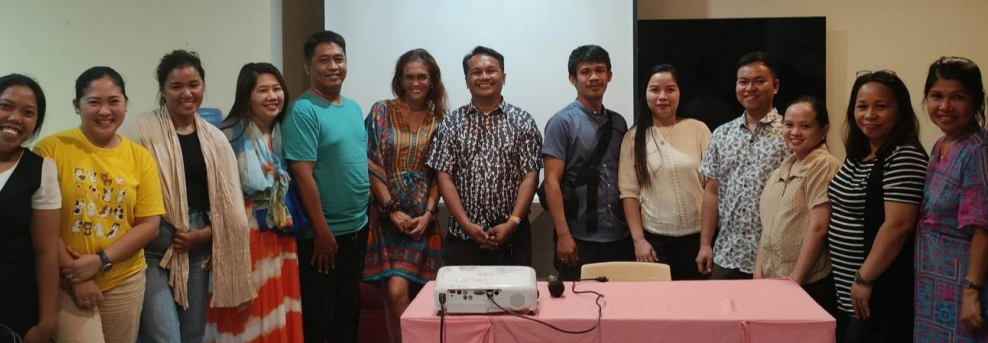
Caraga Food Innovation Center Showcases Cutting-Edge Products and Services at Buy Caraga By Caraga 2023
The Caraga Food Innovation Center’s participation in the “Buy Caraga By Caraga 2023” event supports several Sustainable Development Goals (SDGs), particularly SDG 8 (Decent Work and Economic Growth), SDG 9 (Industry, Innovation, and Infrastructure), and SDG 12 (Responsible Consumption and Production). By providing local entrepreneurs and processors with access to product testing, consultations, and food product development, the Center fosters an environment of innovation that promotes sustainable growth within Caraga’s food industry.
The event, organized by the Department of Trade and Industry Caraga, also provided a vital platform for local businesses to connect with regional innovation hubs, strengthening the region’s economic and industrial infrastructure, as aligned with SDG 9. The Center’s services encourage responsible consumption and production practices (SDG 12) by enabling local businesses to enhance product quality, reduce waste, and adopt sustainable food production techniques. Furthermore, the opportunity for visitors to purchase and sample locally developed food items highlighted the importance of supporting local economies, advancing SDG 8 by creating job opportunities and empowering regional entrepreneurs to achieve economic self-sufficiency. Through initiatives like these, the Caraga Food Innovation Center demonstrates its commitment to driving sustainable development within the region’s food sector.

CReATe of Caraga State University Strengthens Partnerships through International Conference Participation
The Center for Resource Assessment, Analytics, and Emerging Technologies (CReATe) at Caraga State University (CSU) advances multiple Sustainable Development Goals (SDGs) through its initiatives and partnerships, especially SDG 9 (Industry, Innovation, and Infrastructure), SDG 12 (Responsible Consumption and Production), and SDG 17 (Partnerships for the Goals).
Engr. Sanchez’s role as a resource speaker at the 2nd International Conference in Science and Technology and Routine to Research 2023 (NCST-R2R) held at Udon Thani Rajabhat University in Thailand demonstrates CReATe’s commitment to fostering sustainable innovation in food production through agricultural waste valorization. This approach contributes directly to SDG 12 by promoting sustainable food production practices that reduce waste and maximize resource efficiency.
Additionally, the conference aimed to enhance academic cooperation across the ASEAN region, aligning with SDG 17, which encourages global partnerships. The memorandum of understanding (MOU) signed between Udon Thani Rajabhat University and Caraga State University exemplifies how institutional collaborations strengthen regional networks in science and technology. This partnership promotes the sharing of knowledge, research, and resources, creating an infrastructure for sustainable development across borders. Through these initiatives, CReATe is actively contributing to sustainable and innovative practices, supporting goals that emphasize responsible production, innovation, and collaborative progress.
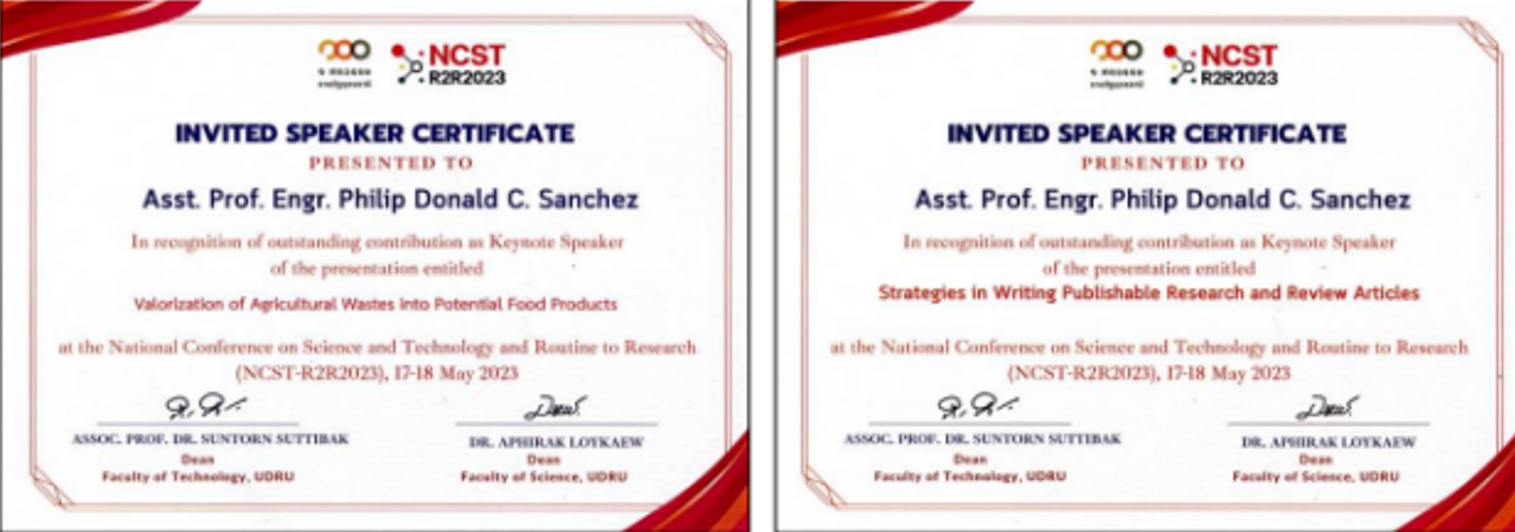
Navigatu TBI Director and Team Attend Inclusive Business Accelerator Programme to Drive Social Innovation.
The participation of Navigatu TBI Director Prof. Melbert R. Bonotan and TBI Incubation Project Head Ms. Jenelyn Refamonte-Asis in the Inclusive Business Accelerator Programme (IBAP) aligns with the United Nations Sustainable Development Goals (SDGs), particularly with goals such as SDG 8 (Decent Work and Economic Growth), SDG 9 (Industry, Innovation, and Infrastructure), and SDG 10 (Reduced Inequalities). Held in Manila from May 23-25, 2023, the IBAP—an initiative by PASUC’s Platform for Innovating SUCs for Industry 4.0—supports social innovation aimed at providing sustainable livelihoods, goods, and essential services to underserved communities, focusing on inclusive growth.
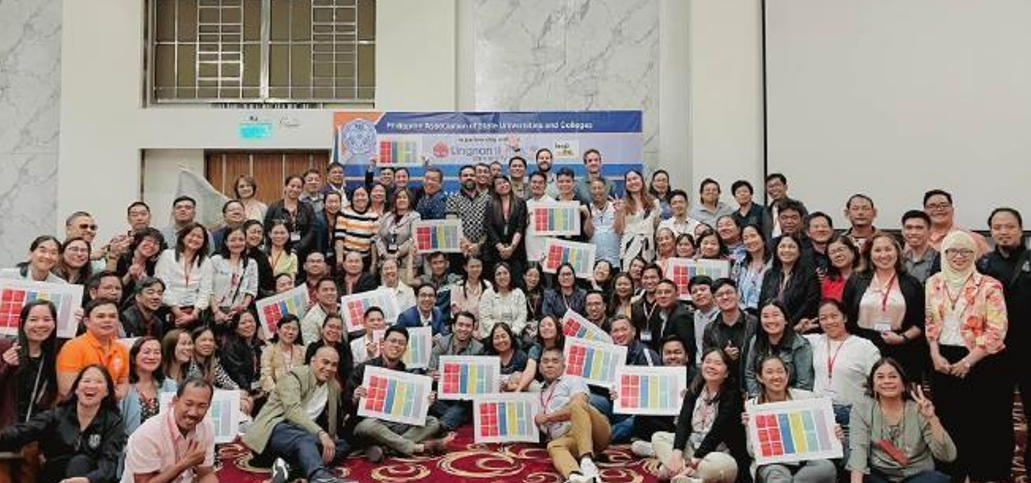
This program, in collaboration with Lingnan University in Hong Kong, seeks to build a framework for fostering inter-university cooperation and deploying humanitarian technology solutions in local communities. By focusing on scalable social innovation, IBAP empowers higher education institutions to contribute directly to economic inclusion and resilience in marginalized areas, reinforcing efforts to reduce inequalities and drive sustainable community development. Through initiatives like IBAP, Navigatu TBI and its partners are making strides toward a more inclusive and sustainable society, advancing progress toward achieving the SDGs.
𝗖𝗦𝗨 𝗽𝗿𝗼𝗯𝗲𝘀 𝘀𝘂𝘀𝘁𝗮𝗶𝗻𝗮𝗯𝗹𝗲 𝗱𝗲𝘃𝗲𝗹𝗼𝗽𝗺𝗲𝗻𝘁 𝗶𝗻 𝗮𝗻𝗻𝘂𝗮𝗹 𝗥𝗗𝗘 𝗜𝗻-𝗛𝗼𝘂𝘀𝗲 𝗥𝗲𝘃𝗶𝗲𝘄
In the pursuit of academic excellence and a steadfast commitment to continuous growth, Caraga State University (CSU) places Research, Development, and Extension (RDE) at the forefront of its endeavors. A testament to this dedication was the annual RDE In-House Review last August 30, 2023, organized by the Office of the Vice President for Research, Innovation, and Extension (OVPRIE) and led by the Director for Research and Development Publication Office (RDPO), Dr. Joycelyn C. Jumawan. The event served as a platform to assess the effectiveness and impact of the university’s RDE initiatives. This 2023, the theme for the RDE In-House Review was “Driving Sustainable Development: Exploring Industrialization and Innovation in Fishery, Agroforestry, Mining, and Ecotourism (IFAME) for Economic Growth and Environmental Stewardship.“
A total of 35 papers on research, development, and extension projects were presented for the three (3) sessions by their thematic areas, namely, 1) Food, Security, and Climate Change; 2) Health, Education, and Biodiversity; and 3) Energy and Technology.
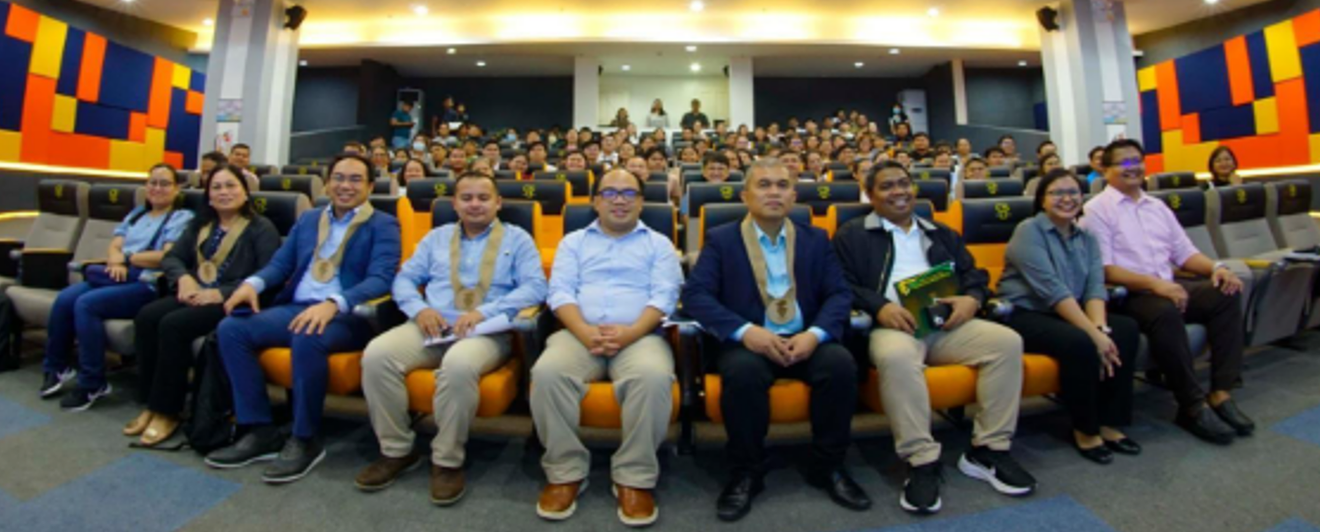
This year’s RDE In-House Review Keynote Speaker was the Regional Director of DOST-Caraga and CSU BOR Member Engr. Noel M. Ajoc. In his message, Engr. Ajoc strongly emphasized the significance of empathy and service in research and innovation. Driven by technology and data, researchers should keep in mind the human factor and the potential influence their efforts can wield on the well-being of others.
Source:
https://www.carsu.edu.ph/?q=news/csu-probes-sustainable-development-annual-rde-house-review-0
𝗖𝗦𝗨’𝘀 𝘀𝘂𝘀𝘁𝗮𝗶𝗻𝗮𝗯𝗹𝗲 𝗺𝗶𝗻𝗶𝗻𝗴 𝗶𝗻𝗻𝗼𝘃𝗮𝘁𝗶𝗼𝗻𝘀 𝘁𝗮𝗸𝗲 𝘀𝗽𝗼𝘁𝗹𝗶𝗴𝗵𝘁 𝗮𝘁 𝗠𝗶𝗻𝗶𝗻𝗴 𝗣𝗵𝗶𝗹𝗶𝗽𝗽𝗶𝗻𝗲𝘀 𝟮𝟬𝟮𝟯 𝗜𝗻𝘁𝗲𝗿𝗻𝗮𝘁𝗶𝗼𝗻𝗮𝗹 𝗖𝗼𝗻𝗳𝗲𝗿𝗲𝗻𝗰𝗲 𝗮𝗻𝗱 𝗘𝘅𝗵𝗶𝗯𝗶𝘁𝗶𝗼𝗻
The Mining Philippines 2023 International Conference and Exhibition, held from September 19-20 at the prestigious EDSA Shangri-La Manila, brought together an array of foremost leaders, technical experts, and investors from the Philippines’ mining industry as well as resource-driven countries such as Australia, Canada, China, and Japan.
The Department of Science and Technology’s Philippine Council for Industry, Energy, and Emerging Technology Research and Development (DOST PCIEERD) took the opportunity to highlight the Sustainable Mineral and Mining Operations Using Industry 4.0 (SuMMO) Program inclusive of the three ongoing projects – Project 1: Information and Communications Technology 4 Responsible Mining (ICT4RM) 2.0, Project 2: MineGEARS, and Project 3: Industry 4.0 Learning Factory for Mining Engineering and Geology in the Academe Using Augmented and Virtual Reality Technologies or MARVEL Tech., implemented at the university.
The contributions of CSU at this international conference highlight the institution’s pivotal role in advancing the Philippines’ mining industry. As the sole university participant, it is a paragon of research and development, bridging the gap between theory and practical, real-world solutions.
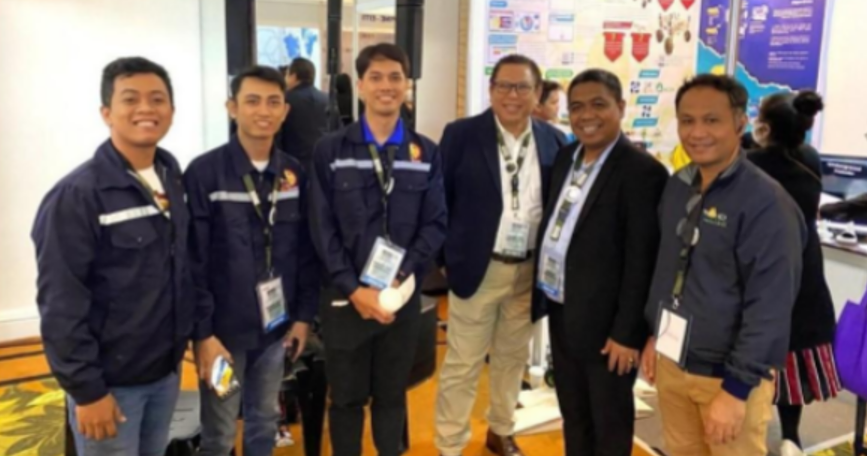
Leading the charge is Dr. Rolyn C. Daguil, the University President, who was at the forefront of this remarkable journey. Alongside him is the Vice President for Administration and Finance, Dr. Alexander T. Demetillo, the SuMMO Director and Project Leader for SuMMO Project 3: MineGEARS, Engr. Rudolph Joshua U. Candare, and Summo Project 3: MARVEL Technologies Project Leader, Dr. Jaymer M. Jayoma.
Source:
𝗖𝗦𝗨, 𝗽𝗮𝗿𝘁𝗻𝗲𝗿 𝗮𝗴𝗲𝗻𝗰𝗶𝗲𝘀 𝗵𝗼𝘀𝘁 𝗖𝗮𝗿𝗮𝗴𝗮 𝗛𝗲𝗮𝗹𝘁𝗵𝗰𝗼𝗻 𝟮𝟬𝟮𝟯
Caraga State University, in collaboration with the Caraga Health Research and Development Consortium (CHRDC), the Department of Science and Technology (DOST), and the Department of Health-Caraga (DOH-Caraga), hosted Caraga Healthcon 2023 at the H.E.R.O Learning Commons Auditorium on November 8-9, 2023. Marking its sixth year, the convention underscored the importance of sustainable development within Caraga, aligning with this year’s theme, “Sustainable Development in Caraga: Resilience through Health Research, Technology, and Innovation.”
The event brought together academic institutions, government agencies, health experts, and stakeholders, offering a dynamic platform for knowledge sharing, collaboration, and innovation. Attendees engaged in a range of activities designed to inspire health research and community resilience, including Plenary Sessions, the 3-Minute Pitch to Policymakers Competition, Wellness Sessions, a Health Quiz Bowl, Visual Poster Exhibit Contest, Oral Health Research Paper Presentations, and Health Technology Idea Pitching Competitions. Each activity provided participants with opportunities to share innovative research, present technology-driven solutions to health challenges, and explore strategies for enhancing health outcomes in the Caraga region.
Caraga Healthcon 2023, formerly the Caraga Health Research Forum (CHRF), is held annually in November to advance CHRDC’s mission to “address health challenges, find solutions to health issues, and prioritize health research and development.” This mission aligns closely with the United Nations Sustainable Development Goals (SDGs), particularly SDG 3 (Good Health and Well-being), SDG 9 (Industry, Innovation, and Infrastructure), and SDG 17 (Partnerships for the Goals). By fostering a collaborative research environment, the event drives innovation in healthcare, empowering the region to develop sustainable health solutions that improve quality of life and community resilience.
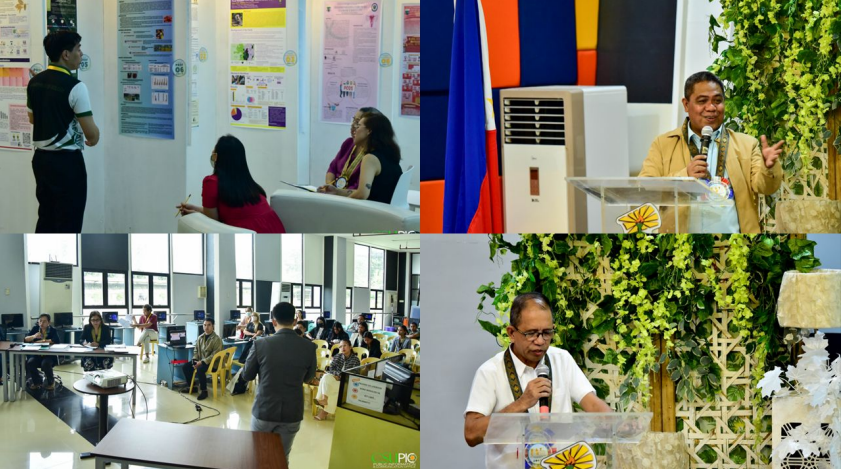
The 2023 LIKHA Summit (SciTech4Dev Forum)
The 2023 LIKHA Summit, a rebranding of the former SciTech4Dev Forum, took place from November 20-24, 2023, at Caraga State University’s HERO Learning Commons. The theme, “Leveraging Innovation, Knowledge, and Holistic Adaptation,” reflects CSU’s commitment to innovative solutions and comprehensive adaptation strategies for regional challenges.
The summit aimed to foster collaboration among the academe, industry, and local government, with stakeholders presenting sector-specific needs to guide research efforts. CSU’s goal is to contribute meaningfully to the region’s development, aligning with the plans of regional agencies.
The first day featured impactful speeches, including CSU President Dr. Rolyn C. Daguil’s unveiling of the LIKHA Agenda, and presentations from external experts sharing success stories. Key government agencies outlined their plans for Caraga, emphasizing a coordinated approach to regional development.
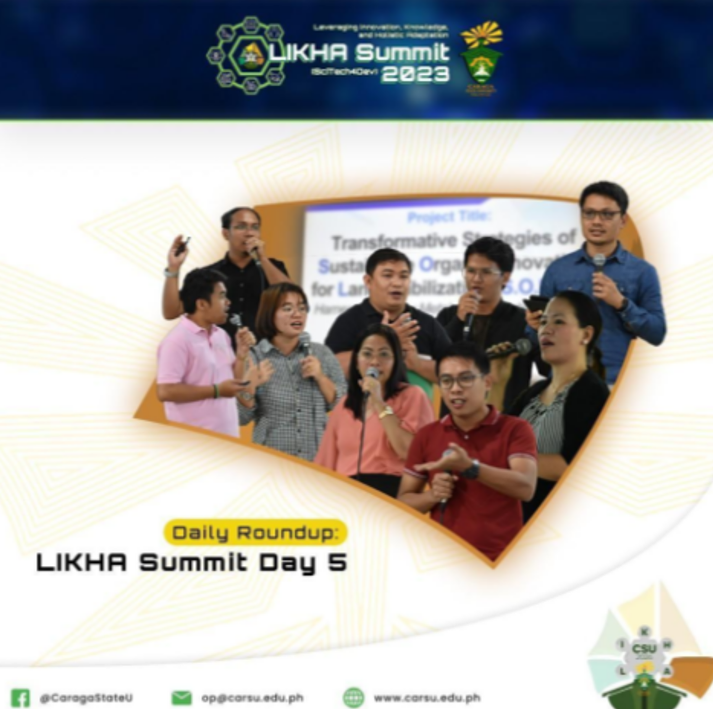
Caraga Regional Innovation and Start-up Week
The Caraga Regional Innovation & Start-up Ecosystem event, held from November 21-24, 2023, served as a catalyst for fostering entrepreneurship, technological innovation, and sustainable development in the region, aligning with the United Nations Sustainable Development Goals (SDGs), particularly SDG 8 (Decent Work and Economic Growth) and SDG 9 (Industry, Innovation, and Infrastructure).
The event brought together State Universities and Colleges (SUCs) and Higher Education Institutions (HEIs) across the Caraga Region to engage in workshops, pitching competitions, and networking opportunities. Its purpose was to ignite entrepreneurial spirit, nurture creative ideas, and promote collaboration, mentorship, and idea incubation, providing aspiring entrepreneurs with a dynamic platform to develop and scale their ventures.
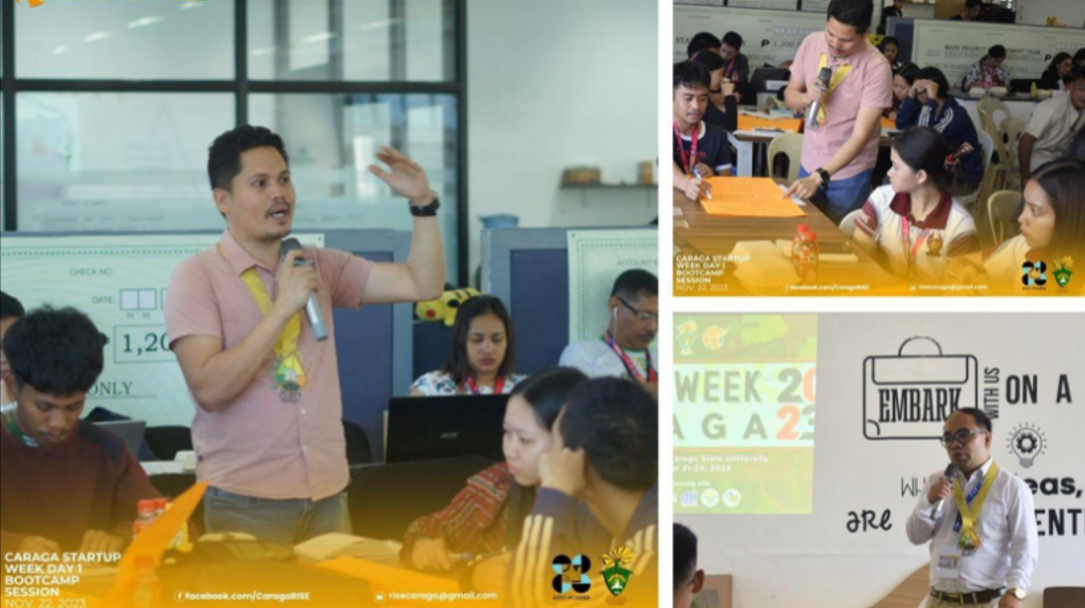
Caraga Startup Week 2023 featured innovative solutions in key sectors such as agriculture, mining, education, smart cities, and tourism, among others. These sectors were strategically chosen to address regional challenges and foster economic and social development, contributing to SDG 2 (Zero Hunger) through agricultural innovation, SDG 4 (Quality Education) in educational advancements, and SDG 11 (Sustainable Cities and Communities) through smart city initiatives.
By facilitating a startup ecosystem, the event aims to create an environment that supports innovation, entrepreneurial growth, and the development of sustainable solutions tailored to the region’s needs. This initiative plays a crucial role in nurturing the entrepreneurial ecosystem in Caraga, enabling local entrepreneurs to turn their unique ideas into impactful, scalable solutions for the community, and supporting long-term regional development.
C𝗦𝗨 𝗵𝗼𝘀𝘁𝘀 𝗡𝗥C𝗣’𝘀 𝟮𝟭𝘀𝘁 𝗠𝗶𝗻𝗱𝗮𝗻𝗮𝗼 𝗥𝗲𝗴𝗶𝗼𝗻𝗮𝗹 C𝗹𝘂𝘀𝘁𝗲𝗿 C𝗼𝗻𝘃𝗲𝗻𝘁𝗶𝗼𝗻 𝗮𝗻𝗱 𝗦𝘁𝗮𝗸𝗲𝗵𝗼𝗹𝗱𝗲𝗿𝘀’ 𝗘𝗻𝗴𝗮𝗴𝗲𝗺𝗲𝗻𝘁
The Department of Science and Technology – National Research Council of the Philippines (DOST-NRCP), in collaboration with Caraga State University, the Mindanao Development Authority (MinDA), and the Department of Science and Technology (DOST) Caraga Region, hosted the 21st NRCP Mindanao Regional Cluster Convention and Stakeholders’ Engagement: Strengthening Networks with LGUs, HEIs, and the Third Sector from November 30 to December 1, 2023, at the HERO Learning Commons. Themed “Towards a Positive VUCAD2 Future: Science, Technology, and Innovation’s Role in Sustainable Development in the Mindanao Region,” the convention focused on advancing sustainable development through collaboration and innovation, in line with the United Nations Sustainable Development Goals (SDGs), particularly SDG 9 (Industry, Innovation, and Infrastructure) and SDG 17 (Partnerships for the Goals).
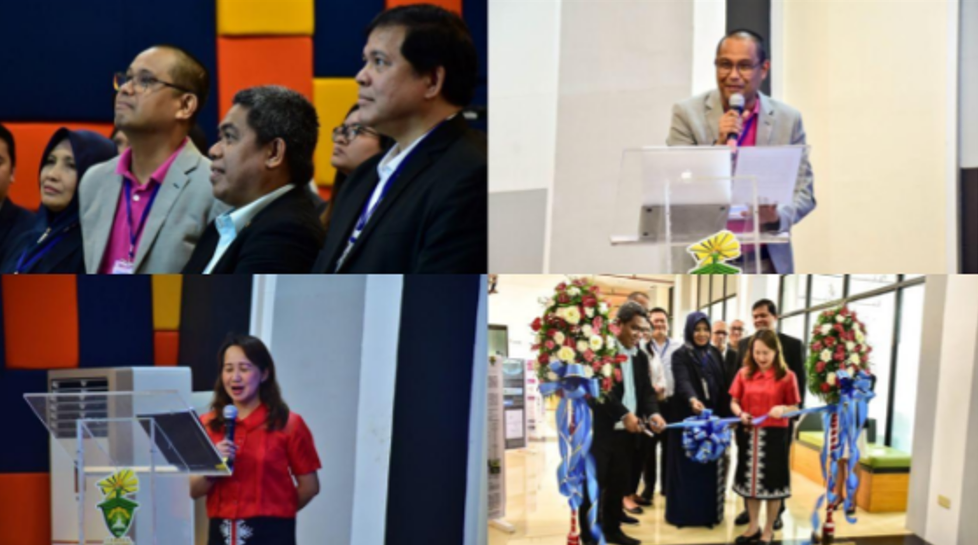
University President Dr. Rolyn C. Daguil warmly welcomed the NRCP representatives, led by Dr. Ephrime B. Metillo, Chair of the NRCP Mindanao Regional Cluster. This was the first time Caraga State University (CSU) hosted the prestigious two-day convention.
The first day of the event showcased poster exhibits from Higher Education Institutions (HEIs) and featured paper presentations from institutions such as Northern Bukidnon State University, Ateneo de Davao University, and the Ministry of Science and Technology – Bangsamoro Autonomous Region in Muslim Mindanao. Discussions centered on the benefits of NRCP membership, culminating in the oath-taking ceremony of new associates and regular members.
On the second day, stakeholders engaged in plenary and breakout sessions, where research presentations covered diverse topics including policy research for local government legislation, eco-tourism, and transdisciplinary research. These discussions provided valuable insights into how science, technology, and innovation can drive sustainable development and address regional challenges.
This convention emphasized the vital role of collaboration between government agencies, higher education institutions, and other sectors in contributing to the sustainable development of Mindanao. Participants left with a deeper understanding of how their collective efforts in research and innovation can help build a resilient and prosperous future for the region.
RDI Center Directors and other Faculty members enrolled in Wadhwani Foundation Entrepreneurship Training
During the month of July 2023, all the personnel of Navigatu, which included faculty members from the Main and Cabadbaran campuses, participated in a comprehensive Wadhwani Foundation Entrepreneurship Training for Faculty. The primary objective of this training was to help faculty members develop the necessary skills and knowledge required to teach entrepreneurship effectively. It also aimed to support the university’s goal of transforming into an entrepreneurial university.
The training commenced on July 4, 2023, and continued until July 27, 2023. The training program was designed to cover a wide range of topics, including Innovation, Design Thinking, Business Model Canvas, and Go-to-Market Strategies. The training sessions were conducted by experienced professionals who provided the necessary guidance and support to the participants.

Upon the completion of the entire training program, faculty members were awarded certificates of completion. Furthermore, those who successfully completed the program and had a semester of deployment were given the opportunity to become Wadhwani Certified Entrepreneurship teachers. This involved teaching Entrepreneurship or Innovation courses using the Ignite platform.
The Wadhwani Foundation Entrepreneurship Training for Faculty was a significant step towards achieving the university’s goal of becoming an entrepreneurial university. It provided the faculty members with the necessary skills and knowledge to teach entrepreneurship effectively, which would help future entrepreneurs to start their own ventures and contribute to the country’s economic growth.
ICT4RM 2.0 joined the Caraga Resilient Mining Week 2023
On July 25-27, 2023, three Personnel from the ICT4RM 2.0 joined the Caraga Resilient Mining Week 2023 at Philippine Gateway Hotel, Surigao City, with various stakeholders and guests from the mining industry, related firms, and mining engineers in the Philippines. The event is bannered with the theme, “Forging a new path towards Community Resilience,” which is also aligned with the SuMMO Program’s objective of focusing on “digital transformation” of mining technology such as web portal for monitoring and evaluation tools, data analytics, collective intelligence, Internet of Things (IoT) based applications, Artificial Intelligence (AI) enabled systems, and open-source and green technologies, among others, can help strive for safe, efficient, and sustainable practices in mineral exploration, extraction, and beneficiation of mining industries in the Caraga Region. The event opened by welcoming all participants and highlighting the significance of the activity. The need to emphasize the current status quo of the mining industry and ways to move forward was addressed during the preliminary sessions of the event. Engr. Marie Claire O. Virtudazo, Project Staff of ICT4RM 2.0, presented a Program brief and developments and accomplishments of the Project, highlighting “digital transformation” in mining. The event opened an opportunity for the Project to emphasize its significance to a large audience of mining engineers from various companies and institutions.
Another notable event was the Official Launching and Workshop of the Online Social Development and Management Program (SDMP) with MGB RO XIII and ComRel, which took place on August 25, 2023, at Philippine Gateway, Sagisi Hall, Surigao City. The workshop began with Dr. Vicente A. Pitogo, Project Staff, introducing the entire workflow of the system and the objectives of Project ICT4RM 2.0, followed by Mr. John Sherwin C. Tadios, Project Technical Specialist IV, presenting the workflow of Online SDMP. Online SDMP is a web-based application that gathers data on the Mining Company’s project/program/activity (PPA).
Training of Trainers for Good Manufacturing Practices
The Food Innovation Center (FIC) Personnel underwent a two-day Trainers Training Program on Current Good Manufacturing Practices held at the Watergate Hotel in Butuan City on August 15-16, 2023. The training was well-attended by representatives from different State Universities and Colleges (SUCs) in the Caraga Region, including Caraga State University (CSU), Caraga State University-Cabadbaran Campus (CSU- CC), Surigao del Norte State University (SNSU), North Eastern Mindanao State University (NEMSU), and Agusan del Sur State College of Agriculture and Technology (ASSCAT).
The participants were taught the core components of Good Manufacturing Practices, including the best practices in food handling, storage, and distribution. The training also covered the methods for conducting in-plant audits and hygiene assessments to ensure that all food manufacturing facilities comply with the Food and Drug Administration (FDA) standards.
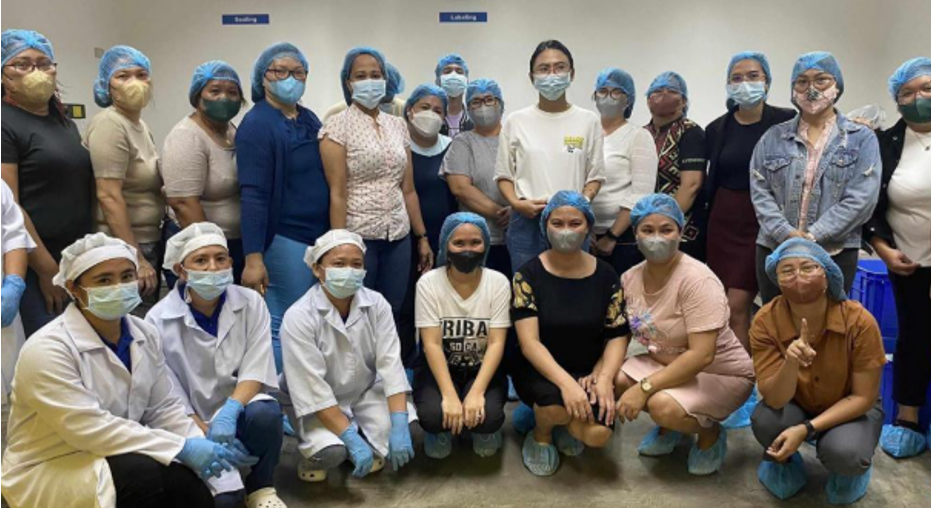
As part of the program, the participants had the opportunity to visit Nature’s Apothecary in Buenavista, Agusan del Norte, which is an FDA-accredited manufacturing plant. The visit provided the participants with hands-on experience in observing the different food manufacturing processes and the application of Good Manufacturing Practices in a real- life setting. The Trainers Training Program provided the participants with valuable insights into the importance of Good Manufacturing Practices and how they can be applied to ensure the safety and quality of food products.
17.2.3 International Collaboration for SDG Data Gathering
Caraga State University (CSU) has actively engaged in collaborations to enhance data exchange and gathering efforts in support of the United Nations Sustainable Development Goals (SDGs). These partnerships focus on research initiatives that address pressing environmental, social, and technological challenges, contributing to sustainable development. Key collaborations include:
- Memorandum of Agreement (MOA) between MSU-IIT, MSU-Naawan, and CSU for the DOST-NRCP funded project: “Assessment of Plastic Debris and Microplastics in Different Specimens (Fish, Sediment, Water, Benthic Organisms) in Selected Aquatic Environments in Mindanao and Exploration of Relative Stress Biomarkers.” This project aims to contribute to SDG 14 (Life Below Water) by assessing the impact of plastic pollution on aquatic ecosystems.
- Research Funding Agreement (RFA) between CHED, MSU-IIT, MSU-Naawan, and CSU for the CHED-LAKAS funded project: “Development of Paper-based Colorimetric Sensors Utilizing Varied Sizes of Gold Nanoparticles for Rapid and On-site Detection of Various Meat Product Spoilage.” This innovative project aligns with SDG 9 (Industry, Innovation, and Infrastructure) by developing technology for food safety, contributing to health and economic growth.
- Memorandum of Understanding (MOU) (in progress) between DLSU, PNRI, PUP, MSU-Naawan, and CSU for the DOST-PCHRD funded project: “Smart Multifunctional and Indigenous Dressing Sterilized under Electronbeam as Novel Wound Repair Matrices (SMIDERM).” This collaboration seeks to develop advanced health solutions, supporting SDG 3 (Good Health and Well-being) by innovating in medical technologies for wound care.
- Socio-Economic Impact Assessment of the Cabadbaran Fish Sanctuary on the coastal communities of Cabadbaran City. Funded by the LGU of Cabadbaran, this project, led by CSU-CREME, aims to assess the impact of conservation efforts on local communities, contributing to SDG 14 (Life Below Water) and SDG 1 (No Poverty) by supporting sustainable fisheries.
- Exploratory Discussions on the Conservation of Carmen Watersheds focus on ensuring the sustainable management of vital water resources, which ties into SDG 6 (Clean Water and Sanitation) and SDG 15 (Life on Land), addressing the importance of water conservation for both ecological balance and community well-being.
These collaborations demonstrate CSU’s commitment to advancing research and innovations that contribute to the achievement of SDGs, enhancing local and global efforts for sustainable development.
17.2.4 Collaboration for SDG best practice
Caraga State University (CSU) exemplifies collaboration for SDG best practices through its partnerships with global and local entities to address environmental, educational, and socio-economic challenges. For instance, CSU’s strategic alliance with RTI International and USAID on the SIBOL program focuses on biodiversity and ecosystem services, advancing sustainable resource management and natural resource governance. Furthermore, CSU promotes innovation and knowledge exchange, as seen in its collaboration with international experts in data science and environmental research, fostering sustainable development through SDG 13 (Climate Action) and SDG 17 (Partnerships for the Goals). Initiatives like satellite-based community networks launched by USAID and the Caraga ICT Council also illustrate the power of multi-sectoral partnerships to enhance connectivity and drive inclusive economic growth, supporting SDG 9 (Industry, Innovation, and Infrastructure) and SDG 8 (Decent Work and Economic Growth). These efforts reflect CSU’s ongoing commitment to sustainable development, showcasing how strategic partnerships can contribute to the achievement of the SDGs.
17.2.4.1 International collaboration on research
Caraga State University Ties Up with RTI International on USAID-Funded Ecosystem Services Research Project
RTI International and Caraga State University (CSU) have established a strategic research partnership for the SIBOL (Sustainable Interventions on Biodiversity, Oceans, and Landscapes) program, a five-year initiative focused on enhancing natural resource governance, promoting sustainable resource management, and combating environmental crimes. The program is being implemented by RTI International in collaboration with USAID and consortium partners, with CSU serving as the academic partner. CSU’s role centers on tracking and quantifying ecosystem services to support informed decision-making on land and water use.
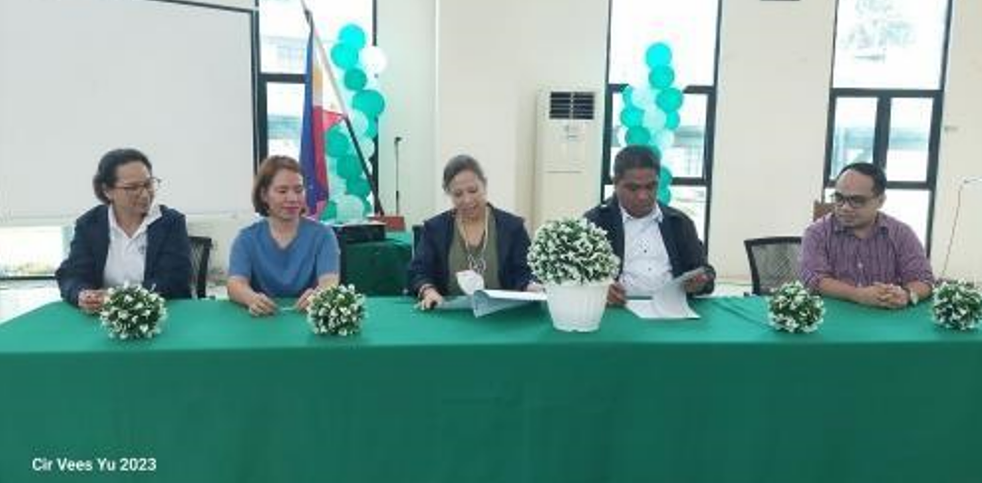
The core objective of the SIBOL program is to assess and calculate the value of various ecosystem services that are crucial to the sustainability of natural resources and the well-being of local communities. These services include:
- Climate Regulation: Understanding the role of ecosystems in mitigating climate change, such as carbon sequestration in forests and wetlands.
- Water Regulation: Evaluating how natural landscapes, such as watersheds and wetlands, contribute to managing water cycles, ensuring reliable water supply and quality.
- Soil Erosion Control: Assessing the role of ecosystems, such as forests and coastal vegetation, in preventing soil erosion, which is critical for agriculture and infrastructure protection.
- Coastline Protection: Examining the role of coral reefs, mangroves, and coastal forests in buffering coastal communities against storms, flooding, and erosion, which are particularly important in the context of climate change.
- Recreational, Spiritual, and Provisioning Services: Valuing ecosystems’ contributions to cultural, recreational, and subsistence needs, including fishing, tourism, and other community-based livelihood activities.
Additionally, SIBOL aims to create national fisheries and coral reef asset accounts, which will help quantify the economic and environmental value of marine resources, particularly fisheries and coral reefs that are vital to both the economy and biodiversity. This effort aligns with the broader goals of SDG 14 (Life Below Water) and SDG 15 (Life on Land) by fostering sustainable practices in marine and terrestrial ecosystems. The program will also update national forestry accounts, contributing to the management of forest resources and aiding in the development of sustainable forest policies. This is a significant step toward SDG 13 (Climate Action) and SDG 12 (Responsible Consumption and Production), helping to integrate ecosystem service values into national development strategies and policy-making. By calculating the value of these ecosystem services, the program will provide decision-makers with the necessary data to balance development and environmental protection, ultimately leading to more sustainable land and water use practices. The partnership between RTI and CSU thus represents a pivotal effort to enhance environmental governance, foster sustainable development, and combat the degradation of vital ecosystems.
Source:
Three CSU Faculty Researchers Attend HCVA-NCA Toolkit Training as Part of SIBOL Project
Three faculty members from Caraga State University (CSU)—Dr. Sherryl Paz, Mr. Laurence Calagui, and Miss Shirlamaine Calagui—participated in a four-day High Conservation Value Areas-Natural Capital Accounting (HCVA-NCA) Toolkit Writeshop in Quezon City. This event is part of the Sustainable Interventions for Biodiversity, Oceans, and Landscape (SIBOL) Project, a five-year initiative led by RTI International in partnership with the Department of Environment and Natural Resources (DENR) and the Bureau of Fisheries and Aquatic Resources (BFAR). The primary goal of the SIBOL Project is to enhance natural resource governance, reduce environmental crimes, and improve the sustainability of key biodiversity areas in the Philippines.
The HCVA-NCA framework is a critical tool for the SIBOL Project. It provides science-based guidance for interpreting High Conservation Value Areas (HCVAs) and integrates Natural Capital Accounting (NCA) methods. This framework is designed to assess and recognize the ecological, economic, and social value of critical ecosystems, ensuring that conservation efforts align with broader development objectives. HCVAs are areas of high biodiversity significance, which may include unique ecosystems, endangered species habitats, or areas crucial to ecosystem services such as water regulation, carbon sequestration, and soil fertility.
The writeshop aimed to introduce and further refine this framework for national application, ensuring that stakeholders, including experts and government agencies, understand how to incorporate HCVA-NCA principles into their conservation practices and decision-making processes. During the event, the participants discussed and developed a toolkit that will guide the identification, mapping, and management of HCVAs, supporting the sustainable management of protected areas in the country.
The HCVA-NCA toolkit also facilitates informed policy development and management decisions regarding protected areas. It will provide data and strategies to balance development goals with environmental protection, ensuring that areas with high conservation value are maintained for future generations.
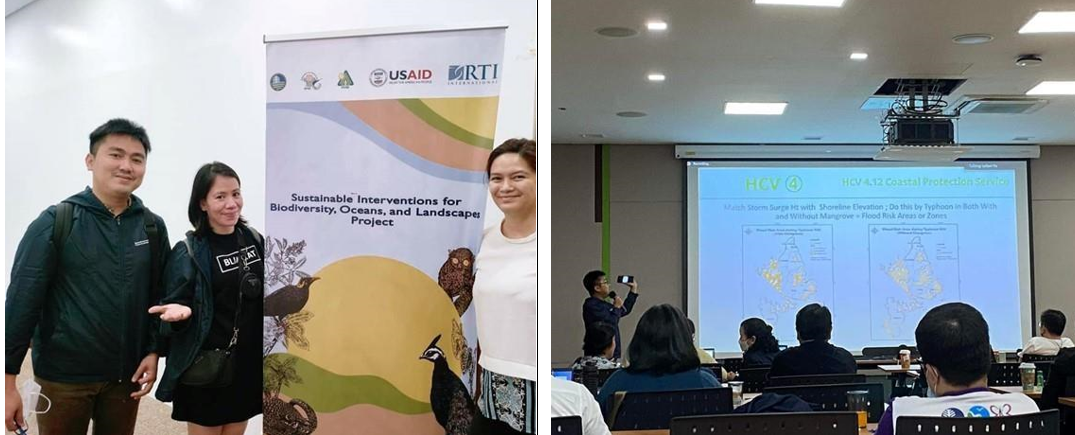
For the SIBOL Project, this toolkit serves as an essential component of a larger effort to combat environmental degradation and protect biodiversity hotspots in the Philippines. The collaboration among experts, government agencies, and academic institutions like CSU strengthens the project’s impact, promoting integrated management strategies and fostering multi-sectoral cooperation. By contributing to the development of the HCVA-NCA framework, CSU faculty members are playing a key role in advancing the project’s objectives, ensuring that natural resource governance is based on scientific evidence and that conservation efforts are sustainable and effective in the long term.
The writeshop also emphasized securing collaboration between various stakeholders, including government bodies and non-governmental organizations, to ensure a coordinated approach to biodiversity conservation, and to integrate ecosystem service values into national policy and decision-making processes.
𝗖𝗛𝗔𝗦𝗦 𝗯𝗼𝗼𝘀𝘁𝘀 𝗿𝗲𝘀𝗲𝗮𝗿𝗰𝗵 𝗮𝗻𝗱 𝗲𝘅𝘁𝗲𝗻𝘀𝗶𝗼𝗻 𝗲𝗻𝗴𝗮𝗴𝗲𝗺𝗲𝗻𝘁 𝘁𝗵𝗿𝗼𝘂𝗴𝗵 𝗛𝘂𝗺𝗮𝗻 𝗜𝗻𝘁𝗲𝗹𝗹𝗶𝗴𝗲𝗻𝗰𝗲 𝗳𝗼𝗿𝘂𝗺 𝘄𝗶𝘁𝗵 𝗗𝗿. 𝗣𝗶𝗲𝘁𝘀𝗰𝗵𝗻𝗶𝗴
The College of Humanities and Social Sciences (CHASS), spearheaded by the Department of Psychology, recently elevated its research and extension initiatives through the Scientific Forum on Human Intelligence, held on August 11, 2023. Featuring Dr. Jakob Pietschnig, a Professor from the University of Vienna, Austria, the forum offered valuable discussions on human intelligence for faculty members and students, providing new insights and deepening theoretical foundations in psychology and social sciences.
This forum supports multiple United Nations Sustainable Development Goals (SDGs), particularly SDG 4 (Quality Education) and SDG 17 (Partnerships for the Goals). By enhancing the understanding of human intelligence and fostering critical research interests among faculty and students, CHASS is promoting high-quality education in psychology and social sciences, advancing SDG 4. The involvement of Professor Jeffrey T. Dellosa, Vice President for Research, Innovation, Extension, and Innovation, underscores the institution’s commitment to cultivating a robust research culture and supporting faculty and student development.

Dr. Jakob Pietschnig, who leads the University of Vienna’s Individual Differences and Psychological Assessment Unit, shared insights from his research on intelligence, including the Flynn effect and biological underpinnings of intelligence. This knowledge exchange opens doors to potential academic partnerships, contributing to SDG 17 by encouraging cross-border collaborations in psychological research and innovation. Through these collaborative efforts, CHASS aims to enrich research opportunities and foster academic growth, supporting sustainable education and research excellence in the region.
Source:
Math dept invites prof emeritus from France for volunteer lecturer course: ‘Data Assimilation and Machine Learning for Environmental Problems’
Caraga State University (CSU) recently hosted a Volunteer Lecturer Course on ‘Data Assimilation and Machine Learning for Environmental Problems’ with Professor Emeritus Mark Asch from the Université de Picardie Jules Verne in France, held from October 9 to October 19, 2023. This initiative underscores CSU’s commitment to SDG 17: Partnerships for the Goals, as it fosters global academic cooperation and promotes knowledge exchange between institutions in the Philippines and abroad.
The course brought together faculty members and graduate students from CSU, Mindanao State University (MSU) Main, MSU Iligan Institute of Technology, and Agusan del Sur State College of Agriculture and Technology (ASSCAT). By exploring the intersection of data assimilation and machine learning, the program provided participants with valuable insights into using advanced technologies to address pressing environmental challenges, contributing to SDG 13: Climate Action. This aligns with the broader goal of harnessing innovative approaches to combat environmental degradation and promote sustainable practices.
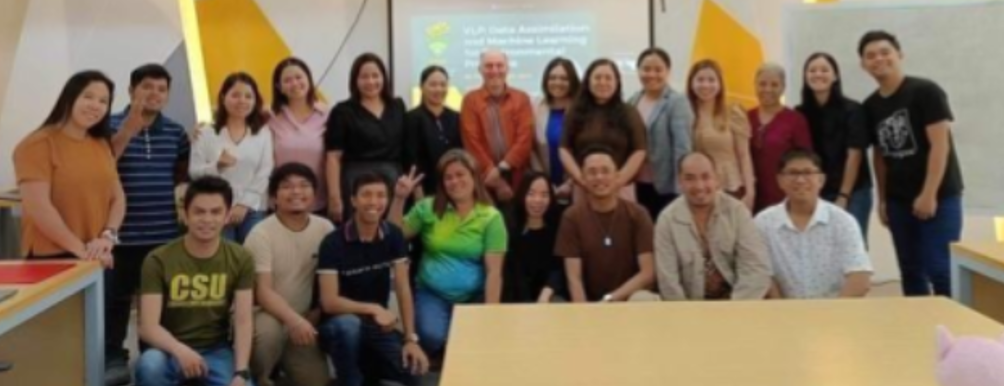
The collaboration with Professor Mark Asch, an esteemed figure in the field, highlights the importance of international partnerships for capacity building and knowledge transfer, key elements of SDG 17. This collaboration not only enhanced participants’ understanding of the theoretical and practical applications of data assimilation and machine learning but also encouraged cross-border research initiatives that could influence future environmental policies and solutions in both the Philippines and globally.
Additionally, the Volunteer Lecturer Program, initiated by the International Mathematical Union (IMU) – Commission for Developing Countries, provides financial support to developing nations to host academic professionals, thereby promoting global research collaboration and academic excellence in developing countries. This initiative directly contributes to SDG 4: Quality Education, ensuring that institutions in developing nations gain access to cutting-edge research and knowledge, thus bridging the gap in educational and research opportunities.
By facilitating such collaborations, CSU is not only enhancing local capacities but is also contributing to the achievement of the Sustainable Development Goals (SDGs) by promoting innovative partnerships, expanding research networks, and creating long-term solutions to environmental and development challenges. The lasting impact of this collaboration is expected to influence environmental research and sustainability initiatives, both regionally and globally.
Source:
https://www.carsu.edu.ph/?q=news/math-dept-invites-prof-emeritus-france-volunteer-lecturer-course
SAID, Caraga ICT Council launch satellite-based community networks
On June 1, 2023, the United States Agency for International Development (USAID), in collaboration with the Caraga ICT Council and various partners, launched satellite-based community networks in Brgy. San Mateo and Brgy. Tungao, Butuan City. This initiative, part of USAID’s Better Access and Connectivity (BEACON) project, aims to enhance digital connectivity and infrastructure in underserved areas, with a focus on supporting the KM7 Farmer Producers Cooperative (KFPC).
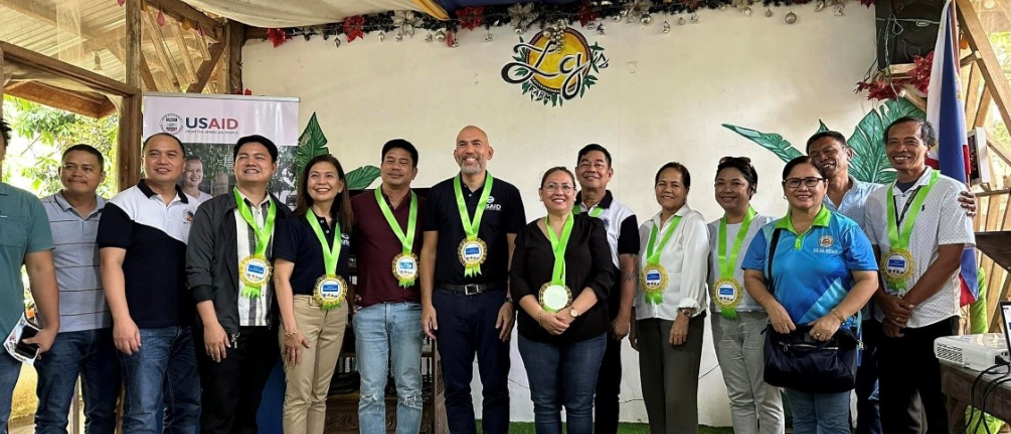
The project, which involved partnerships with Kacific Broadband Satellites and Stellarsat Solutions, Inc., seeks to provide internet connectivity to the KFPC, improving business operations and access to vital information. As a result, KFPC and surrounding communities are expected to benefit from increased economic opportunities, contributing to inclusive development in the region.
This initiative is a clear example of collaboration for SDG best practices. By fostering partnerships between international agencies, local governments, and community organizations, the project promotes SDG 9: Industry, Innovation, and Infrastructure, ensuring that even the most remote areas have access to digital connectivity, a fundamental component of modern economic development. Additionally, this project aligns with SDG 8: Decent Work and Economic Growth, creating more inclusive economic opportunities for marginalized communities.
Key stakeholders such as Butuan City officials, Department of Information and Communications Technology (DICT), National Economic and Development Authority (NEDA), Caraga State University (CSU), Department of Trade and Industry (DTI), Department of Agriculture (DA), and Department of Education (DepEd) all participated in the launch, further reinforcing the power of multi-sectoral collaboration. This collective effort exemplifies the importance of international cooperation, community engagement, and technological innovation in achieving sustainable development goals, especially in underserved regions.
Through these partnerships, the project establishes a model for global collaboration, demonstrating how innovative infrastructure solutions can be scaled to address local challenges, promote inclusive growth, and enhance access to information and economic opportunities for marginalized populations.
17.2.5 Collaboration with NGOs for SDGs
Caraga State University (CSU) is committed to advancing the Sustainable Development Goals (SDGs) through strategic collaboration with non-governmental organizations (NGOs). These partnerships foster impactful student engagement, cutting-edge research, and the development of educational resources aimed at creating lasting community and societal benefits. For example, student volunteer programs, such as the One Million Malunggay Tree Planting Project, encourage active involvement in environmental sustainability, directly supporting SDG 13 (Climate Action). Similarly, research collaborations with NGOs, like the partnership with the Semiconductor and Electronics Industry of the Philippines (SEIPI), drive innovation and workforce development, aligning with SDG 9 (Industry, Innovation, and Infrastructure). Through these collaborations, CSU empowers students and faculty while contributing to local and global sustainability efforts, ensuring a holistic approach to the SDGs.
17.2.5.1 Student Volunteering Programmes
CSU Cabadbaran Students Lead the Way in the One Million Trees Campaign for Environmental Conservation
The One Million Trees campaign has seen enthusiastic student involvement, especially from students at CSU Cabadbaran City Campus, who volunteered to plant trees in schools and degraded areas. This hands-on participation by students has helped reshape local landscapes, promote environmental protection, and inspire conservation values in their communities. Through these efforts, students have contributed to environmental sustainability and raised awareness about the importance of preserving natural resources, encouraging further community engagement in protecting and restoring local forests.

Source:
Technology Transfer: Collaborative Retrofitting of the Sago Rasping Machine with ABE Students and the Kaba-ang Livelihood Association
On October 16, 2023, a collaborative inception meeting was held by the project team and faculty from the Department of Agricultural and Biosystems Engineering to develop a plan for ongoing retrofitting and monitoring of the sago rasping machine deployed to the Kaba-ang Livelihood Association in Barangay Baan, Butuan City. This machine, originally provided to support the association’s livelihood, required adjustments to meet the unique needs of its users. The retrofitting process involved replacing one of the machine’s electrical motors and fine-tuning its design based on feedback from the association members, ensuring it could handle the local sago rasping demands effectively.
ABE students participated alongside association members in the retrofitting activity, enhancing their hands-on learning experience in agricultural engineering. This partnership supports both student education and the livelihood development of the community.
A follow-up monitoring session on November 24, 2023, included another group of ABE students who observed the machine’s operational status and gathered further feedback. During this visit, the association’s president, Hon. Agnes Sas, discussed specific improvements to optimize the machine’s performance, highlighting the community’s active role in co-designing solutions tailored to their needs. The initiative reflects an integrated approach where technical knowledge, student involvement, and community input work together to achieve sustainable improvements.
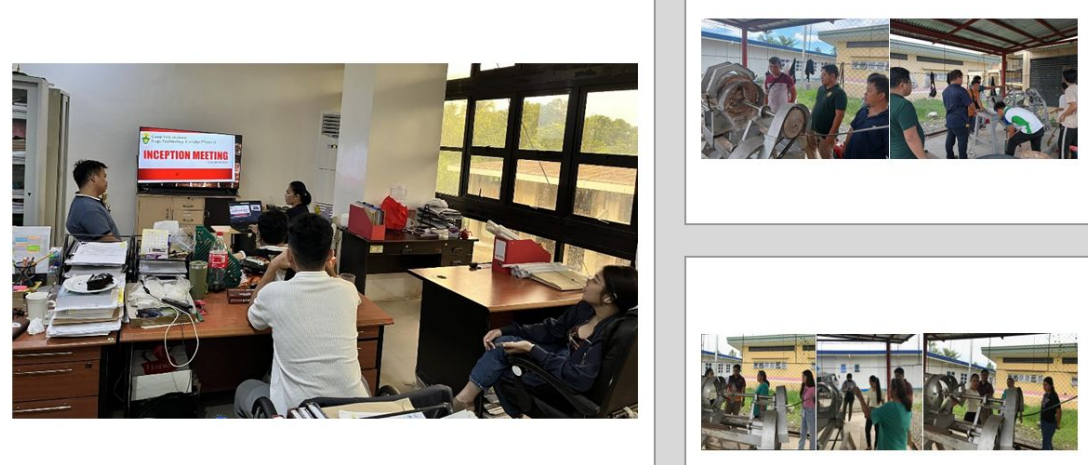
17.2.5.2 Research Programmes with NGOs
CSU Partners with SEIPI to Advance Research and Innovation in Semiconductor and Electronics Industry
In an important step toward bridging academic expertise with the rapidly advancing semiconductor and electronics industry, Caraga State University (CSU) formalized a partnership with the Semiconductor and Electronics Industry of the Philippines, Foundation, Inc. (SEIPI) through a Memorandum of Agreement (MOA) signed on August 18, 2023. Representing CSU, Engr. Jeffrey T. Dellosa emphasized academia-industry collaboration, addressing SEIPI members on the pivotal role of education in preparing skilled talent for the sector.
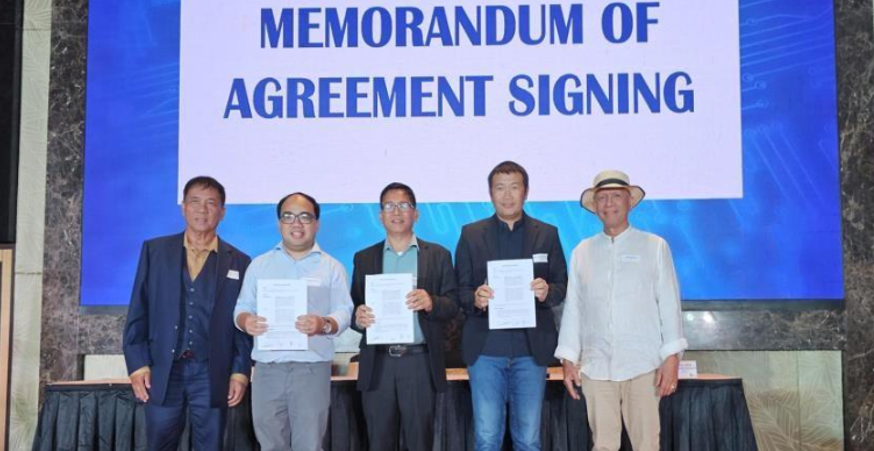
This CSU-SEIPI partnership supports SDG Goal 9 (Industry, Innovation, and Infrastructure) by enhancing local industry capability and developing a workforce equipped for technological advancements. This collaboration aims to foster research, mutual growth, and innovation, positioning students and graduates to contribute meaningfully to the sustainable development of the semiconductor and electronics industries in the Philippines.
Source:
17.2.5.3 Development of Educational Resources
Faculty members Partners with Wadhwani Foundation Entrepreneurship Training
The Wadhwani Foundation Entrepreneurship Training for Faculty, conducted throughout July 2023, was a pivotal initiative aimed at equipping faculty members from Caraga State University (CSU) with the knowledge and skills necessary to teach entrepreneurship effectively. The training covered essential topics such as innovation, design thinking, business model development, and market strategies, empowering faculty to use the Ignite platform to teach entrepreneurship courses. This initiative supports CSU’s strategic goal of becoming an entrepreneurial university and aligns with SDG 17.2.5 by fostering global partnerships for sustainable development and empowering educators to contribute to national economic growth.

By enhancing the capacity of faculty, the training ensures that future entrepreneurs at CSU are equipped with modern, practical tools and skills that will enable them to navigate and succeed in dynamic markets, supporting innovation-driven growth in the Philippines.
17.3 Publication of SDG reports
17.3.1 Report on SDG1: No Poverty
You can access the full report in the SDG1 publication here: View SDG 1
Caraga State University (CSU) is deeply committed to reducing poverty and promoting social equity, with a strong alignment to Sustainable Development Goal 1 (No Poverty). Through its comprehensive research, development, innovation, and extension (RDIE) efforts, CSU addresses the root causes of poverty and works to create sustainable pathways for marginalized communities. The university’s initiatives focus on economic empowerment, education, and community partnerships to improve livelihood opportunities, particularly in economically disadvantaged areas.
Research and Evidence-Based Solutions for Poverty Reduction
CSU plays a pivotal role in researching and implementing strategies for poverty alleviation. The university’s research efforts are focused on sustainable agriculture, microenterprise development, and technology-based education, providing evidence-based solutions that can be scaled across the region. CSU collaborates with local government units, non-government organizations (NGOs), and industry partners to amplify the impact of these research initiatives.
Key Projects in 2023:
- DOH-WRA Project: Focused on improving women’s health as part of broader poverty alleviation strategies.
- Coffee Production Extension: Assisting coffee farmers in Agusan del Norte to improve their farming practices and productivity.
- DOST-NSTEP Lumad Spirituality Project: Promoting cultural preservation and economic well-being among indigenous groups.
- Support for Vulnerable Populations: Empowering women through small business training and workshops.
- Educational Support Initiatives: Providing financial and academic resources for low-income students to continue their education.
- Livelihood Outreach Programs: Offering training and skills development to improve community income.
Other CSU-led initiatives include supporting micro, small, and medium enterprises (MSMEs), facilitating technology transfer for local food processing, and fostering community-based entrepreneurship projects. These efforts are essential to creating long-term, sustainable economic frameworks that contribute to poverty eradication and inclusive growth in the region.
Financial Aid and Support for Low-Income Students
CSU actively supports low-income students through various financial aid programs, ensuring that education is accessible to those who need it the most. In the second semester of the academic year 2022-2023, CSU provided financial aid to 7,730 students, which increased to 9,712 students in the first semester of 2023-2024. A total of 17,442 students received financial assistance. Key scholarship programs include free tuition under the Universal Access to Quality Tertiary Education Act (RA 10931) and the Tertiary Education Subsidy (TES).
Anti-Poverty Programs at CSU
In its commitment to combating poverty, CSU runs numerous programs that promote education, health, and social empowerment. These include scholarships, community extension programs, and research initiatives designed to uplift marginalized communities. The university also supports social enterprises and offers student work-study opportunities to help alleviate financial burdens.
Support for Students from Low-Income Families
CSU provides comprehensive support to ensure the academic success of low-income students, particularly those from the bottom 20% income group. Initiatives include:
- Scholarships and Financial Assistance: Providing a range of financial aid options, including tuition coverage and living stipends.
- Academic Support Services: Offering tutoring, mentoring, and counseling to help students overcome academic challenges.
- Student Housing: Providing affordable on-campus housing, with the construction of a new dormitory valued at PHP 19.3 million to enhance student well-being.
- Food Services: Offering affordable on-campus food options.
- Transportation Assistance: Ensuring that transportation needs are addressed for low-income students.
Support for Students from Low or Lower-Middle-Income Countries
Caraga State University (CSU) extends substantial support to students from low and lower-middle-income countries, reinforcing its commitment to accessibility in education. Through both university-funded and government-funded scholarship programs, CSU ensures that financially disadvantaged students have the opportunity to pursue higher education. Scholarships such as the CHED Full and Half Merit Programs, as well as the Iskolar ng Bayan, are pivotal in covering the educational expenses of deserving students. These programs are designed to ease the financial burdens of students, enabling them to focus on their academic and personal growth. By removing financial barriers, CSU helps to empower students, especially those from underprivileged backgrounds, and contributes to the larger goal of fostering inclusive educational access in the region and beyond.
Local Start-Up Assistance and Financial Support
CSU plays a proactive role in nurturing local entrepreneurship, recognizing that small businesses and start-ups are vital to local economic development. The university offers robust support through its Bachelor of Science in Entrepreneurship program, which equips students with the skills needed to launch and manage their own businesses. Additionally, CSU has established incubators such as Navigatu and Tara, which provide mentorship, training, and resources to support early-stage businesses in sectors critical to the region, including agriculture, fisheries, and ecotourism. These incubators help entrepreneurs navigate the complexities of business development, from idea generation to scaling operations. Through partnerships with government agencies such as the Department of Science and Technology (DOST), CSU is also able to offer funding and grants to local businesses, ensuring they have the financial resources to thrive. For example, the MapX Project Management Team received PHP 800,000 in funding, empowering them to expand their initiatives. By focusing on entrepreneurship, CSU is not only fostering individual business success but also stimulating regional economic growth, innovation, and sustainability.
Improving Access to Basic Services
CSU is deeply committed to improving access to essential services for communities in the Caraga region. Recognizing the integral role of livelihood and health in poverty alleviation, the university implements various programs aimed at enhancing these areas. One of the key initiatives is the Sustainable Livelihood Program (SLP), in collaboration with the Department of Social Welfare and Development (DSWD). This program helps marginalized communities build sustainable income sources through skill development and livelihood training. Additionally, CSU runs an extension project focused on enhancing coffee production in Caraga, which directly benefits local farmers by improving their farming practices and boosting their income. The Techno Gabay Program, in partnership with the Department of Agriculture, plays a critical role in facilitating access to modern agricultural technologies, ensuring that local farmers can benefit from innovative solutions to increase their productivity. These programs not only enhance community well-being but also contribute to the broader goal of creating sustainable, locally-driven solutions to poverty.
CSU’s Role in Policy-Making to Address Poverty
Caraga State University is actively engaged in policy-making efforts at the local, regional, and national levels, ensuring that its research and innovation efforts align with broader goals of poverty reduction and sustainable development. CSU’s involvement in the NEDA Caraga Region Development Plan (RDP) 2023-2028 highlights the university’s commitment to contributing to the creation of jobs, the development of skills, and the support of micro, small, and medium enterprises (MSMEs). These priorities are aligned with the overarching objectives of Sustainable Development Goal 1 (No Poverty). CSU’s participation in the Regional Development Council ensures that the university’s initiatives, particularly those in research and community development, are in direct response to the needs and challenges of the region, amplifying their impact. By aligning its academic and outreach programs with local and national poverty alleviation strategies, CSU helps shape policies that foster inclusive growth and sustainable development.
SDG Catch-Up Plan and CSU’s Contribution
As part of its contribution to global development efforts, CSU plays a key role in the development of the SDG Catch-Up Plan, which aims to accelerate the progress of Caraga toward the United Nations’ 2030 Agenda. Through extensive research, data analysis, and community engagement, CSU helps identify gaps in the achievement of SDG targets, particularly those related to poverty reduction, health, and sustainable economic development. The university’s work in capacity-building ensures that local stakeholders are equipped with the knowledge and tools necessary to implement SDG initiatives effectively. CSU also provides technical assistance to enhance monitoring and evaluation systems, supporting the development of innovative solutions, such as sustainable agricultural practices and renewable energy projects. Through its comprehensive approach, CSU is helping to accelerate Caraga’s journey toward a more sustainable, inclusive future.
Local Policy Formulations
CSU’s role in policy development goes beyond academic research; the university is committed to co-designing initiatives that reflect the needs and aspirations of local communities. By working directly with communities, CSU ensures that poverty alleviation strategies are grounded in local realities, fostering practical and sustainable solutions. CSU integrates its academic resources, including research and expertise, to drive local innovation and entrepreneurship, which are key components of economic resilience. Through these efforts, the university is an active participant in the formulation of local policies that promote sustainable development. CSU’s support for local economic activities, such as agriculture and micro-enterprise development, helps ensure that the community’s growth is equitable and benefits all members, particularly the most vulnerable. By playing a critical role in regional and local policy formulation, CSU continues to contribute to the reduction of poverty and the promotion of sustainable, inclusive growth.
You can access the full report in the SDG1 publication here: View SDG 1
17.3.2 Report on SDG2: Zero Hunger
Sustainable Development Goal 2 (SDG 2) aims for food security, improved nutrition, and sustainable agriculture. Caraga State University (CSU) supports these goals through its Research, Development, and Extension (RDE) initiatives, showcased in the annual RDE In-House Review held on August 30, 2023. The event, themed “Driving Sustainable Development: Exploring Industrialization and Innovation in Fishery, Agroforestry, Mining, and Ecotourism (IFAME),” highlighted research on Food Security, Climate Change, soil health, and biodiversity. By advancing sustainable practices and resilience in food systems, CSU contributes to SDG 2 and regional food security efforts.
CSU probes sustainable development in annual RDE In-House Review
Caraga State University (CSU) demonstrated its dedication to Research, Development, and Extension (RDE) through its annual RDE In-House Review on August 30, 2023, organized by the Office of the Vice President for Research, Innovation, and Extension (OVPRIE). Themed “Driving Sustainable Development: Exploring Industrialization and Innovation in Fishery, Agroforestry, Mining, and Ecotourism (IFAME) for Economic Growth and Environmental Stewardship,” the event featured 35 presentations across three thematic areas: Food Security and Climate Change; Health, Education, and Biodiversity; and Energy and Technology.

Keynote speaker Engr. Noel M. Ajoc, DOST-Caraga Regional Director and CSU Board of Regents member, emphasized empathy and service in research. Awards were presented for best paper, best presenter, and best research poster, celebrating exceptional contributions in fields such as soil health, biodiversity, mining, and hydrological analysis.
Source:
https://www.carsu.edu.ph/?q=news/csu-probes-sustainable-development-annual-rde-house-review-0
17.3.3 Report on SDG3: Good Health and Wellbeing
Caraga State University (CSU) plays a vital role in advancing Sustainable Development Goal 3 (SDG 3), dedicated to ensuring healthy lives and promoting well-being across all ages. CSU’s commitment to this goal is evident in a range of initiatives, combining mental health advocacy, community engagement, and research-focused projects that collectively address diverse health challenges within its region.
One of the university’s flagship events, the annual Psychology Days, underscores its dedication to mental health and emotional well-being. During the Psychology Days, students, faculty, and mental health professionals come together to participate in a series of forums, lectures, and interactive activities, creating an inclusive environment where mental health awareness is brought to the forefront. This year’s program, held in October, centered around the theme of equity and well-being, incorporating lectures on Psychological First Aid, which taught participants essential skills in providing emotional support to those in need. Through engaging discussions and practical exercises, students learned strategies to foster safe, stigma-free spaces where they can help peers facing mental health challenges. By empowering students with these skills, CSU not only cultivates individual resilience but also encourages a campus-wide culture that prioritizes compassion and mental health support, a crucial step in improving overall community well-being.
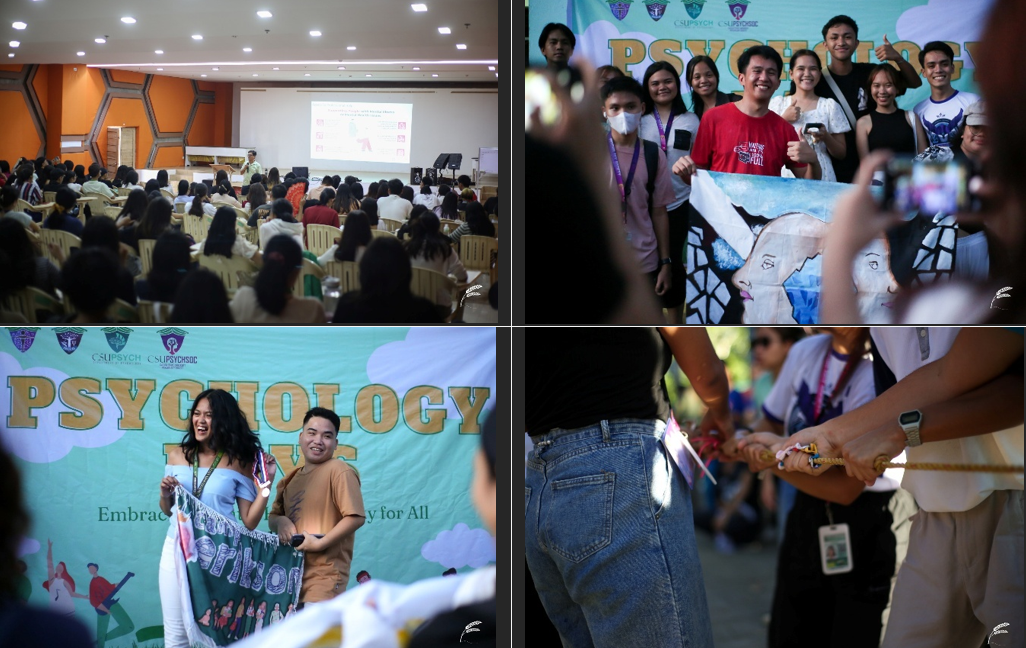
Complementing its mental health advocacy, CSU also advances SDG 3 through its annual Research, Development, and Extension (RDE) In-House Review. This year’s RDE Review, themed “Driving Sustainable Development: Exploring Industrialization and Innovation in Fishery, Agroforestry, Mining, and Ecotourism (IFAME) for Economic Growth and Environmental Stewardship,” provided a platform to showcase research with tangible health and environmental benefits. A total of 35 papers on research, development, and extension projects were presented, including projects focused on health, education, biodiversity, food security, climate change, and technology. Many of these research projects directly contribute to improving public health, promoting sustainable food sources, and addressing climate-related health impacts—factors that have an overarching influence on well-being. The event’s keynote speaker, Engr. Noel M. Ajoc, Regional Director of DOST-Caraga, highlighted the importance of empathy and the human element in research and innovation, underscoring the potential of research to positively impact lives.
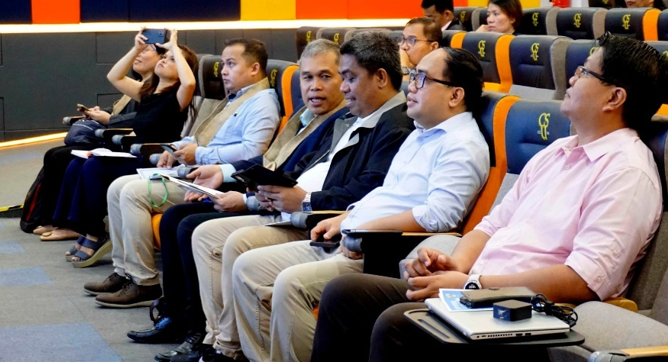
Together, CSU’s initiatives in mental health awareness and research-driven public health advancements demonstrate its holistic approach to SDG 3. By combining student-centered mental health programs with community-engaged research, CSU fosters both immediate and long-term improvements in health and well-being, positioning the university as a proactive agent of positive change in the region.
Sources:
https://www.facebook.com/thegoldpanicles/
https://www.carsu.edu.ph/?q=news/csu-probes-sustainable-development-annual-rde-house-review-0
17.3.4 Report on SDG4: Quality Education
Caraga State University (CSU) is committed to achieving Sustainable Development Goal (SDG) 4 by providing inclusive, equitable, and quality education. Through initiatives like the Pre-University Intervention Program (Pre-UIP) and outreach activities, CSU removes barriers to education and supports marginalized groups, especially underprivileged and first-generation students.
The Pre-UIP, a six-week program, helps students who did not meet the cut-off score for the CSU Admission Test (CSU-AT) by offering academic support in Mathematics, English, and Values. In 2023, 336 out of 439 students successfully completed the program, demonstrating its effectiveness in preparing students for higher education.
CSU also emphasizes the inclusion of first-generation students, who make up 55.8% of the student body, reflecting a commitment to increasing access to education for underserved groups. This aligns with SDG 4.4, which aims to enhance skills for decent work and entrepreneurship, fostering a more resilient society.
CSU’s outreach programs, such as the Kids’ Day Out, Peace Camp, and Math and Science Camp, reach diverse community groups, promoting social cohesion, critical thinking, and life skills. These initiatives ensure that quality education is accessible to all, regardless of background.
By focusing on lifelong learning and offering workshops and training programs, CSU strives to create an inclusive, quality educational environment. Through these efforts, CSU is actively contributing to SDG 4, empowering individuals, promoting regional and national development, and building a more just and equitable society.
You can access the full report here: View SDG 4
17.3.5 Report on SDG5: Gender Equality
Caraga State University is strongly committed to strategically addressing identified gender disparities within the institution. Its GAD Office organized a training session on Gender Awareness and GAD Tools. This initiative, part of the “Deepening Sessions on Gender Awareness and GAD Tools (HGDG),” reflects a proactive approach to fostering positive change. As the university continues to prioritize gender awareness through gender mainstreaming, the impact of these sessions is expected to influence various aspects of research, academia, and community engagement, fostering a more equitable and harmonious university environment.
In addition, the university initiated a month-long Women’s Month Celebration in 2023 to honor women and their contributions to nation-building. As an active advocate for gender equality, the university hosted the opening of National Women’s Month with the recurring theme “We for Gender Equality and Inclusive Society. #WecanbeEquALL,” in partnership with the Regional Gender and Development Committee. This event is part of the university’s ongoing efforts to promote gender equality and women’s empowerment. The following initiatives have been conducted:
- GAD leads deepening session on gender equality: In support of the campaign to end Violence Against Women (VAW) and promote gender equality, Caraga State University’s Gender and Development (GAD) Office organized a two-day training on Gender Awareness and GAD Tools (HGDG) on December 11-12, 2023. Attended by the university’s GFPS members and faculty researchers, the training aimed to create a safe and equitable environment for all stakeholders. Mr. Oliver Salino from the Commission on Human Rights led sessions on gender analysis and the Harmonized Gender and Development Guidelines. This initiative aligns with the 18-Day Campaign to End VAW and the efforts of the RDC RGADC and RIACAT VAWC.
Source: https://www.carsu.edu.ph/?q=news/gad-leads-deepening-session-gender-equality
- WOMEN’S MONTH CELEBRATION ACTIVITIES: The activities aim to raise awareness, promote gender equality, and empower women in the university and broader community. By engaging all personnel in educational and celebratory events, the university seeks to build a more inclusive and supportive environment for everyone, regardless of gender. Additionally, by wearing purple and engaging with social media, the university encourages a collective, visible commitment to the cause of gender equality.
Source: https://drive.google.com/file/d/1XVuh-ZEySJy8cx8R2keaBBKZgV8YfODa/view?usp=sharing
- CSU Welcomes the Women’s Month Celebration Enthusiastically: The Kinaadman grounds were filled with purple as the Regional Gender and Development Committee (RGADC) led the opening of National Women’s Month, with the theme “We for Gender Equality and Inclusive Society. #WecanbeEquALL,” hosted by Caraga State University to promote gender equality and women’s empowerment. Participants included officials from the Local Government Unit of Butuan, the Department of Social Welfare and Development, the National Irrigation Administration, the Philippine Statistics Authority, and other regional agencies. University President Dr. Rolyn C. Daguil emphasized equality, while Alexander A. Makinano, Philippine Commission on Population Caraga Regional Director, stressed inclusive growth for both men and women. Michelle V. Japitana, Vice President for Executive Operations and Auxiliary Services, concluded by celebrating women’s achievements and calling for their continued success alongside men.
Source: https://www.carsu.edu.ph/?q=news/csu-welcomes-womens-month-celebration-enthusiastically
17.3.6 Report on SDG6: Clean Water and Sanitation
Caraga State University (CSU), in collaboration with Research Triangle Institute (RTI) International, is committed to advancing SDG 6: Clean Water and Sanitation through its partnership in the SIBOL (Sustainable Interventions on Biodiversity, Oceans, and Landscapes) program. This initiative, focused on the valuation of ecosystem services (ES) in the Siargao Island Protected Landscape and Seascape (SIPLAS), aims to improve water regulation, purification, soil erosion control, and coastline protection. Through these efforts, CSU supports sustainable natural resource management and water quality preservation in Siargao.
As part of a broader five-year initiative under DENR, BFAR, and USAID, SIBOL emphasizes integrating ecosystem services into land and water-use decision-making, aligning with SDG 6’s objectives of ensuring clean water access and promoting sustainable water management practices. This project is part of CSU’s broader commitment to sustainable development, as demonstrated by 40 Scopus-indexed publications related to water management and environmental protection.
Recent notable publications include:
- “Plant pathogenic Paramyrothecium species: distribution, biology, epidemiology and disease management” in the European Journal of Plant Pathology, 2024, by Aumentado et al.
- “Socially inclusive valorization of gold mill tailings from the small-scale gold mining sector” in the Global Journal of Environmental Science and Management, 2024, by Balanay et al.
- “Examining Soil Erodibility, Soil pH, and Heavy Metal Accumulation in a Nickel Ore Mine: A Case Study in Tubay, Agusan del Norte, Philippines” in the Environment and Natural Resources Journal, 2023, by Capilitan et al.
- “Bioaccumulation and Potential Human Health Risks of Heavy Metals in the Muscles of Tank Goby (Glossogobius giuris) in Lake Mainit, Philippines” in the Philippine Journal of Science, 2023, by Agtong et al.
- “Detecting mercury ions in water using a low-cost colorimetric sensor derived from immobilized silver nanoparticles on a paper substrate” in Environmental Nanotechnology, Monitoring and Management, 2022, by Budlayan et al.
These publications, along with numerous conference papers and journal articles, reflect CSU’s significant contributions to water quality monitoring, ecosystem preservation, and environmental sustainability, furthering SDG 6 and enriching scientific knowledge in water and environmental management.
List of articles:
https://drive.google.com/file/d/1W-1YJKIsyhKPxTi07D7TRnI41DmpQZjy/view?usp=drive_link
Other sources:
17.3.7 Report on SDG7: Affordable and Clean Energy
Sustainable Development Goal 7 (SDG 7) aims to ensure access to affordable, reliable, and modern energy for everyone. Caraga State University (CSU) is committed to advancing this goal through dedicated energy conservation initiatives on campus. A key example of CSU’s efforts is its proactive participation in the Government Energy Management Program (GEMP), which requires all personnel to set thermostats to 25°C beginning December 1, 2023, to optimize energy use and create a more sustainable work environment.
CSU’s commitment to energy efficiency received national recognition when the Department of Energy (DOE) awarded the university a five-star rating following an audit on November 15, 2023. Achieving a 92% score (Grade A) for its comprehensive electricity and fuel conservation practices, CSU has set a standard of excellence among government institutions in energy management. This accomplishment reflects CSU’s leadership in sustainable practices, including appointing an Enercon Officer and implementing a Fuel Conservation Program. Together, these efforts not only align CSU with SDG 7 but also establish it as a role model for responsible energy management within higher education. Key initiatives include:
Government Energy Management Program (GEMP) Implementation: In compliance with GEMP and to enhance energy conservation, CSU mandates that all university personnel set thermostats to 25°C starting December 1, 2023. This policy is designed to reduce energy consumption and foster a more sustainable workplace.
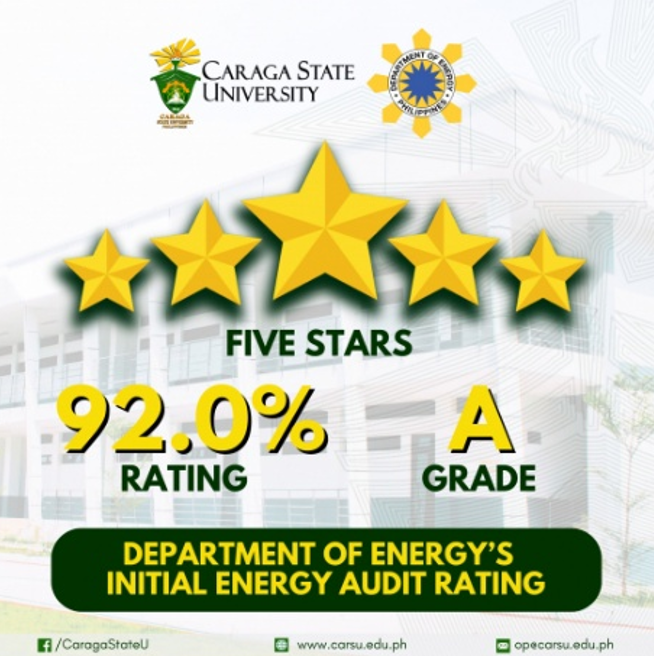
DOE Five-Star Rating for Electricity and Fuel Conservation: After a November 2023 audit by the Department of Energy, CSU was awarded a five-star rating and Grade A status with a 92% score for its effective energy and fuel conservation strategies. CSU’s practices, which include the appointment of an Enercon Officer and a Fuel Conservation Program, demonstrate its commitment to resource conservation and compliance with the Energy Efficiency and Conservation Act (RA No. 11285).
CSU’s commitment to energy conservation underlines its leadership in sustainable practices within the higher education sector, setting a high standard for responsible resource management and aligning closely with the objectives of SDG 7.
Source:
https://drive.google.com/file/d/1uvfq-hxgnnS7Nc78q_dTeAZ2OtvZsqZj/view?usp=drive_link
https://www.carsu.edu.ph/?q=news/csu-earns-five-star-rating-doe-electricity-and-fuel-conservation
17.3.8 Report on SGD8: Decent Work and Economic Growth
Goal 8, Decent Work and Economic Growth, emphasizes fostering inclusive and sustainable economic growth, productive employment, and decent work for all. Recognizing the need for economic resilience and equitable job opportunities, this goal seeks to create fair work environments, uphold labor rights, and ensure that economic progress benefits all, particularly in underserved communities.
Caraga State University (CSU) actively supports this goal by integrating work-readiness programs, entrepreneurship initiatives, and research-driven innovations into its academic framework. Through collaborations with local industries, CSU provides students with practical skills and internships aligned with market demands, preparing them for productive and secure employment. The university also promotes small business development and social entrepreneurship among students, faculty, and local communities, fostering job creation and economic participation.
By embedding Goal 8 into its educational and community outreach programs, CSU contributes to a regional workforce equipped for sustainable economic growth and fosters an inclusive approach to economic progress in Caraga and beyond. Consequently, the university has developed the following activities and strategies:
- CSU Opens its First-Ever Child Care, Breastfeeding, and Changing Room: On November 19, 2019, Caraga State University (CSU), in partnership with the Rotary Club of Central Butuan (RCCB), launched its first Child Care and Breastfeeding/Changing Room on the first floor of CSU’s New Administration Building.
Source:
https://www.carsu.edu.ph/?q=news/csu-opens-its-first-ever-child-care-breastfeeding-and-changing-room
- Policy on Animal-Free Decent Workplace: CSU aims to maintain a safe and healthful campus for students, personnel, and visitors. In line with this, the university intends to create an animal-free workplace to protect its community, safeguard research and income-generating projects, preserve natural reserve areas, comply with the Animal Welfare Act, and ensure public safety. To achieve these goals, it is necessary to establish rulings on impoundment, fees, and animal nuisance control measures.
Source: https://drive.google.com/file/d/1-oO7yaiERbbqoNVArFQJkzC9nkdK-PXi/view
- POLICY ON INTELLECTUAL PROPERTY POLICY: The CSU recognizes the importance of protecting intellectual creations and supporting the development of locally-established industry practices and fair use guidelines. The proposed CSU Intellectual Property (IP) Policy aligns with the State Policy, which acknowledges that an effective intellectual and industrial property system is vital for fostering domestic creativity, facilitating technology transfer, and encouraging investment. It also aims to protect individuals’ intellectual property and creations, particularly when beneficial to the public.
Source:
https://drive.google.com/file/d/1jEyI-vRrgvnK7Vb5LBcvCFWd1KwBpGk4/view
- Adoption of the Policy on the Magna Carta for Health Workers and Its Implementing Rules at Caraga State University: The University Health Workers Policy of CSU aims to comply with Republic Act No. 7305, known as The Magna Carta for University Health Workers, and its Revised Implementing Rules and Regulations. As a high-risk environment, the University seeks to promote and improve the social and economic well-being of its health workers, enhancing their living and working conditions and terms of employment. The policy also focuses on developing the skills and capabilities of health workers to ensure they are more responsive and equipped to deliver health services, projects, and programs. Additionally, it encourages individuals with the necessary qualifications and abilities to join and remain in government service.
Sources: https://drive.google.com/file/d/1dkK6p1lfirCWS1x81qZC_Qfk8cS6uG2u/viewhttps://drive.google.com/file/d/1y27BkRaMM6wzZxwQtLWA29Q5gB0EYSlw/view
- Safe Spaces Development Program in compliance with the Safe Spaces Act (Republic Act No. 11313): On October 4, 2023, the Caraga State University (CSU) Board of Regents approved Resolution No. 81-20, Series 2023, endorsing the Safe Spaces Development Program in compliance with the Safe Spaces Act (Republic Act No. 11313). This initiative aims to establish a secure, inclusive, and respectful campus environment free from discrimination, harassment, and bullying, embracing diverse backgrounds in race, gender, sexual orientation, religion, and ability. Key objectives include fostering inclusivity and respect, integrating gender perspectives across university policies, collaborating with various organizations to strengthen safe spaces, promoting best practices, and conducting safety audits with facility upgrades. Supported by the University’s councils and committees, the program received approval for necessary funding to enhance safety and equity at CSU.
Sources: https://drive.google.com/file/d/1xuePkY9aK3lx77H0u2H2v6P_Uop67mo2/view?usp=drive_link
17.3.9 Report on SDG9: Industry, Innovation, and Infrastructure
Caraga State University (CSU) is making substantial contributions to SDG 9: Industry, Innovation, and Infrastructure through 24 published works that span diverse fields of research. These publications highlight CSU’s commitment to sustainable development by advancing research and innovation in renewable energy, sustainable agriculture, circular economy, and infrastructure improvement.
Key highlights include:
- Renewable and Sustainable Resources: CSU’s research on durian waste as a resource and floating solar photovoltaic systems exemplifies its innovative approach to alternative energy solutions and sustainable food systems. These studies, featured in open-access journals, underscore the potential of utilizing local resources for renewable energy and food processing.
- Technological Advancements: Studies such as the DC-DC boost converter design for Wireless Sensor Network (WSN) applications showcase CSU’s work in electronics and technology. These innovations aim to enhance efficiency and scalability in wireless systems, supporting infrastructure development that can cater to remote and underserved areas.
- Environmental Management: CSU’s commitment to sustainability is evident in projects like estimating carbon footprints during the COVID-19 lockdown, mapping virgin coconut oil production, and assessing falcata plantations with machine learning. These studies utilize satellite and machine learning technologies to support environmental monitoring and resource management.
- Circular Economy and Waste Management: CSU has published extensively on the circular economy, including case studies on the wood-based industry and biofuel economy. These works advocate for resource-efficient and circular business models, particularly in regions where waste management and sustainable practices are critical for community resilience.
- Policy Development and Socioeconomic Impact: CSU’s research on risk assessment for mining, intellectual property (IP) support, and data privacy in e-governance addresses critical policy issues that impact infrastructure and industry. By identifying challenges and suggesting policy frameworks, CSU supports sustainable industrial growth and governance reform.
Each of these studies, while diverse in focus, aligns with SDG 9 by promoting sustainable industry practices, fostering innovative solutions, and supporting resilient infrastructure projects. Through this body of research, CSU advances its role as a leader in sustainable development, innovation, and infrastructure improvement in the Philippines, especially within Mindanao. These publications demonstrate CSU’s commitment to enhancing industry resilience, environmental sustainability, and technological progress, contributing meaningfully to both local and global sustainable development goals.
List of Articles:
https://drive.google.com/drive/folders/1kQ1odFUPpHCICQI1kbz7Tbjk21pPozBQ?usp=sharing
Other Sources:
Conducted Ecological Solid Waste Management Seminar and emphisized shift in waste management. |
17.3.10 Report on SDG10: Reduced Inequality
Caraga State University (CSU) is committed to advancing Sustainable Development Goal 10 (SDG 10) by promoting social, economic, and political inclusion. Through the implementation of the Free Higher Education Program under RA 10931, CSU ensures that education is accessible to students from marginalized and underprivileged sectors, reducing inequality and fostering equal opportunities. Additionally, the university supports diversity and inclusion through competency-based recruitment and pre-university intervention programs that focus on empowering students from diverse backgrounds, including those from 4Ps, Indigenous Peoples, Persons with Disabilities, and others, ensuring no one is left behind in the pursuit of higher education.
Caraga State University’s Commitment to Expanding Access: Advancing SDG 10 through the Free Higher Education Program under RA 10931
Caraga State University (CSU) has been at the forefront of promoting access to higher education, aligning with national efforts to expand opportunities for students through the implementation of the Universal Access to Quality Tertiary Education Act (RA 10931). Signed into law in August 2017, this legislation aims to make tertiary education more accessible to all Filipinos by providing free tuition and other school fees for students in public higher education institutions. CSU has embraced this initiative, ensuring that eligible students are able to pursue higher education without the financial burden of tuition fees, thus opening doors for many who might otherwise be unable to attend college.
In 2023, CSU proudly supported a total of 21,853 students enrolled under the Free Higher Education program. Specifically, during the Academic Year (AY) 2023-2024, CSU enrolled 10,628 students in the first semester. This builds on the success of the program in previous years, with 9,699 students enrolled in the second semester of AY 2022-2023, and 1,526 students during the midyear term. The Free Higher Education program, implemented through the Commission on Higher Education (CHED) and the Department of Budget and Management (DBM), covers not only tuition fees but also various mandatory fees, including laboratory fees, library fees, and other miscellaneous charges. This financial assistance ensures that students can focus on their studies without the added stress of meeting financial obligations, thus fostering a more inclusive academic environment.
This initiative is particularly crucial for students from marginalized sectors and underprivileged backgrounds, many of whom rely on state-funded education to achieve their dreams. By reducing the cost of tertiary education, CSU supports the government’s broader vision of improving educational outcomes and creating a more competitive, skilled workforce. Moreover, the program helps bridge the educational gap between urban and rural communities, where access to quality education has historically been limited.
To ensure the quality of education amidst this growing student population, CSU maintains a faculty-to-student ratio of 1:30, which enables more personalized and focused attention for each student. This favorable ratio allows instructors to provide a higher level of academic support, fostering an environment where students can thrive both inside and outside the classroom. Faculty members are able to engage more directly with students, offering tailored guidance, mentoring, and assistance, which in turn enhances the overall learning experience.
Beyond providing financial relief, the Free Higher Education program at CSU also contributes to the academic and personal development of students. The university continues to create support systems that ensure that students not only have access to education but are equipped to succeed academically. This includes offering scholarships for further studies, internship opportunities, and mentoring programs that help students transition from academic settings into the workforce. As a result, the program does not only alleviate immediate financial concerns but also lays the foundation for long-term success, ensuring that students graduate with the skills and knowledge needed to thrive in their respective fields.
By spearheading this initiative, CSU not only adheres to the provisions of RA 10931 but also demonstrates its commitment to fostering a highly educated and socially responsible generation of leaders, innovators, and professionals. The success of this program at CSU is a reflection of the broader impact of the Universal Access to Quality Tertiary Education Act, helping to fulfill the nation’s vision of a more equitable and prosperous society.
Source: https://drive.google.com/file/d/1yza-8ymwvK58Hm-NIhnTbDYRqRWnp4Gt/view
· Promoting Diversity and Equal Opportunities through Competency-Based Recruitment and Pre-University Intervention Programs
The University empower and promote the social, economic and political inclusion of all, irrespective of age, sex, disability, race, ethnicity, origin, religion or economic or other status through: 1. Competency-Based Recruitment, Selection, and Placement Manual pursuant to BOR Resolution No. 65-10, s. 2022 and 2. Pre-University Intervention Program for incoming students who are 4Ps Beneficiary Indigenous People (IP), Persons with Disability (PWD), child of a Solo Parent, students who have exemplary talent in Sports, Culture, and the Arts (in national level competition), and CSU Employee Legal Dependent (sibling or child).
Sources:
https://drive.google.com/file/d/1LrP2GEqog7FpsVfIx0P0coTQ_TkSEBsx/view?usp=drive_link
https://drive.google.com/file/d/1nk2AebiN1SQy7SglDhX1uKIPGejPXCYL/view?usp=drive_link
17.3.11 Report on SDG11: Sustainable Cities and Communities
Caraga State University (CSU) has made significant strides in contributing to Sustainable Development Goal 11 (Sustainable Cities and Communities) through its numerous environmental initiatives. In 2023, CSU’s efforts were recognized when it won the Best Institutional Composting Facility award in the Ecological Solid Waste Management (ESWM) Evaluation. This recognition, awarded by the City Environment and Natural Resources Office (CENRO), highlights the university’s commitment to waste reduction and environmental sustainability, which are vital components of building more resilient and sustainable communities.
Additionally, CSU’s involvement in the ECOWEB GreenFiber project further emphasizes its role in promoting sustainable practices. By partnering with local communities and focusing on climate-friendly initiatives, the university has supported the development of a renewable energy-powered abaca fiber processing facility. This project not only addresses environmental concerns but also generates new income opportunities for local farmers, contributing to the region’s economic and social well-being.
Through its strategic research partnership with RTI International on the USAID-funded SIBOL program, CSU has been instrumental in assessing and valuing ecosystem services, such as climate regulation, water management, and coastline protection. These efforts are aligned with broader environmental conservation goals, supporting sustainable land and water use practices that are essential for long-term community resilience.
Finally, CSU’s annual Research, Development, and Extension (RDE) In-House Review serves as an important platform to examine the university’s contributions to sustainable development. In 2023, the review focused on key thematic areas such as food security, health, and energy, reinforcing CSU’s commitment to driving innovations that balance economic growth with environmental stewardship.
Through these efforts, CSU not only advances SDG 11 but also fosters a more sustainable, inclusive, and resilient future for both the local community and the environment.
Source:
- CSU wins Best Institutional Composting Facility in 2023 ESWM Evaluation
Link:
https://www.carsu.edu.ph/?q=news/csu-wins-best-institutional-composting-facility-2023-eswm-evaluation
- Participation of CSU to ECOWEB GreenFiber
Link: Coordination Meeting with ECOWEB on the potential partnership on GreenFiber project for local communities and the environment such as implementing climate-friendly measures and providing new sources of income for farmers. - Caraga State University Ties Up with RTI International on USAID-Funded Ecosystem Services Research Project
Link: CSU’s USAID-funded research SIBOL focusing on valuation of ecosystem services (ES) and on the establishment of natural capital accounts in the Siargao Island Protected Landscape and Seascape (SIPLAS) sites. supports SDG 11
- CSU probes sustainable development in annual RDE In-House Review
Link: https://www.carsu.edu.ph/?q=news/csu-probes-sustainable-development-annual-rde-house-review-0
17.3.12 Report on SDG12: Responsible Consumption and Production
Caraga State University (CSU) has made impactful contributions to Sustainable Development Goal 12 (Responsible Consumption and Production) through its proactive approach to promoting sustainable practices, resource conservation, and waste management. The university has showcased its commitment to food security and sustainable innovation by participating in the Buy Caraga by Caraga Balangay Edition Fair, where CSU’s food innovation products were highlighted. These products not only support local food security initiatives but also serve as a platform for knowledge-sharing with Micro, Small, and Medium Enterprises (MSMEs), helping foster sustainable agricultural and business practices.
In the realm of waste management, CSU faculty researchers have significantly contributed to the formulation of the 10-Year Integrated Solid Waste Management Plan for Butuan City. Their research, particularly the study on households’ willingness to pay for improved waste management, has provided key data used in shaping local waste management policies. This research underscores CSU’s role in contributing valuable insights for sustainable urban development and policy-making, ensuring that the city can implement effective waste management strategies.
CSU has also been at the forefront of educating the community on sustainable waste management practices. Through its “No to Plastic Policy” campaign and a series of seminars, including the Ecological Solid Waste Management Seminar in collaboration with the City Environment and Natural Resources Office (CENRO), the university has promoted responsible waste segregation, recycling, and composting. This paradigm shift in waste management emphasizes the importance of reducing waste generation and fostering sustainable disposal practices to protect the environment.
In energy management, CSU has demonstrated its commitment to sustainability by achieving a five-star rating from the Department of Energy for its electricity and fuel conservation efforts. With an impressive score of 92% (Grade A), CSU’s energy-efficient practices, including the establishment of an Enercon Officer and implementation of cost-cutting measures, exemplify its dedication to reducing energy consumption and minimizing the environmental impact of its operations.
Together, these initiatives reflect CSU’s comprehensive approach to responsible consumption and production, supporting SDG 12 by promoting sustainable practices across various sectors, from food security to energy and waste management. The university’s efforts not only contribute to environmental conservation but also encourage a culture of sustainability within the broader community.
Sources:
- Food innovation products of the university showcased in the Buy Caraga by Caraga Balangay Edition Fair supports Food Security and knowledge sharing for MSMEs.
- Project outputs conducted by Caraga State University faculty researchers were utilized as significant datasets in crafting the 10-Year Integrated Solid Waste Management Plan (2020-2029). Waste characterization datasets served as the core in formulating the waste management policy of the Local Government of Butuan. Among the research analyses considered is the paper published in 2023 titled “Estimating Households’ Willingness-to-Pay for an Improved Solid Waste Management in Butuan City, Philippines” can be accessed online.
- No to Plastic Policy campaign through Orientation/Seminar and Office Memorandum
- Conducted Ecological Solid Waste Management Seminar and emphisized shift in waste management.
- https://www.carsu.edu.ph/?q=news/csu-earns-five-star-rating-doe-electricity-and-fuel-conservation
17.3.13 Report on SDG13: Climate Action
Caraga State University (CSU) has significantly contributed to advancing Sustainable Development Goal 13 (Climate Action) through a variety of initiatives aimed at combating climate change, restoring ecosystems, and promoting environmental stewardship across the Caraga region. One of the key efforts is the university’s involvement in a region-wide advocacy program to plant one million malunggay (Moringa oleifera) trees within a year. This ambitious project, supported by higher education institutions and partner agencies, seeks to mitigate climate change by restoring greenery, improving local biodiversity, and making malunggay more accessible to communities for its nutritional and health benefits. The malunggay tree, known for its high vitamin content, is not only a critical environmental asset but also a valuable resource for local health and sustainable agriculture.
The program is aligned with the Enhanced National Greening Program (ENGP) of the Department of Environment and Natural Resources (DENR), which aims to rehabilitate degraded forests and enhance the environmental condition of the region. Through this partnership, the university will collaborate with the 123 associations under the Community-Based Forest Management Agreement (CBFM) to propagate and plant malunggay seedlings across a targeted area of 1,200 hectares. This effort will contribute to climate action by sequestering carbon, preventing soil erosion, and enhancing water retention in the soil.
Moreover, CSU is actively engaged in the SIBOL (Sustainable Interventions on Biodiversity, Oceans, and Landscapes) program, a five-year initiative under the DENR-BFAR-USAID collaboration. This project aims to assess and quantify the ecosystem services provided by the Siargao Island Protected Landscape and Seascape (SIPLAS) sites. Through a partnership with Research Triangle Institute (RTI) International, CSU’s Department of Environmental Science will support the valuation of critical ecosystem services such as climate regulation, water purification, and coastal protection. This initiative will aid in natural resource governance, sustainable management, and the reduction of environmental crimes, which are vital steps in mitigating climate change.
Additionally, CSU’s commitment to climate action was reinforced during the 2023 Research, Development, and Extension (RDE) In-House Review, where the university emphasized the importance of innovation in sectors such as agroforestry, fishery, and ecotourism. The RDE review focused on driving economic growth while ensuring environmental sustainability, aligning with SDG 13’s targets of enhancing adaptive capacity, strengthening climate resilience, and promoting low-emission development strategies.
These initiatives highlight CSU’s integral role in fostering climate action within the Caraga region. By promoting tree planting, researching ecosystem services, and supporting sustainable practices in agriculture and environmental management, CSU is not only contributing to SDG 13 but also creating a lasting impact on the region’s environmental and social resilience.
Sources:
Mitigating Climate Change through “One Million Malunggay Plant Growing Project” |
17.3.14 Report on SDG14: Life below water
Caraga State University (CSU) has significantly contributed to the advancement of SDG 14: Life Below Water through various research, development, and extension initiatives aimed at the conservation and sustainable use of marine and coastal resources in the Caraga region. CSU’s commitment to SDG 14 is reflected in its active involvement in collaborative projects, partnerships, and community-based programs designed to protect marine ecosystems, reduce pollution, and promote sustainable fishing practices.
A prime example of CSU’s impact on SDG 14 is its partnership with the Research Triangle Institute (RTI) International and the Department of Environment and Natural Resources (DENR) under the SIBOL (Sustainable Interventions on Biodiversity, Oceans, and Landscapes) program. This collaboration focuses on the valuation of ecosystem services, including water regulation, soil erosion control, and coastline protection, within the Siargao Island Protected Landscape and Seascape (SIPLAS). By evaluating ecosystem services, CSU supports informed decision-making for sustainable natural resource management, providing critical data for improving marine governance, reducing environmental degradation, and fostering sustainable livelihoods for local communities.
In addition to these efforts, Caraga State University (CSU) has made significant contributions to SDG 14: Life Below Water through various published research and conference papers focused on marine conservation and sustainable fisheries management. Key studies include:
- Spatio-Temporal Scales of Land Cover and Shoreline Dynamics in Banaybanay, Davao Oriental: This study utilizes remote sensing to assess land cover and shoreline changes, offering valuable insights for coastal management (2024).
- IoT-Enabled Aquaculture Surveillance System: Proposing an IoT-based system for enhanced fisheries management, contributing to sustainable aquaculture practices (ICACIC 2023).
- Inventory of Fish Fauna in Siargao Island: A study critical for preserving fish biodiversity in Siargao, helping maintain marine ecosystem health (2022).
- Water Quality Monitoring System for Shrimp Aquaculture: Development of a monitoring system for shrimp farm water quality, supporting sustainable aquaculture (ICECET 2022).
- Baseline Study of Decapoda and Mollusca Diversity in La Union: Providing insights into marine biodiversity in Cabadbaran, aiding local conservation efforts (2021).
- Health Risk from Heavy Metals in Asiatic Clams: Examining the health risks of heavy metals from clam consumption, emphasizing pollution monitoring (2021).
- Water Quality Assessment on Marine Fish Cage Sites in Nasipit: Utilizing remote sensing and GIS to assess water quality for marine aquaculture (ACRS 2021).
These studies collectively contribute to sustainable marine resource management and conservation in line with SDG 14.
CSU’s involvement extends beyond research into practical initiatives, such as its active participation in the National Greening Program (NGP), where the university collaborates with the Commission on Higher Education (CHED), DENR, and local higher education institutions to plant malunggay (Moringa oleifera) trees in coastal areas. This initiative helps mitigate climate change, restore coastal greenery, and integrate sustainable practices into the region’s greening efforts.
Moreover, CSU’s Ecological Solid Waste Management Seminar, organized by the Pollution Control and Environmental Management Office (PCEMO), educates students, faculty, and local communities on waste segregation, recycling, and proper disposal, contributing to the reduction of ocean pollution. This aligns with broader efforts to protect marine ecosystems from harmful waste, including plastics.
Through these initiatives, CSU not only helps preserve marine biodiversity but also fosters sustainable practices that will safeguard oceans and coastal ecosystems for future generations. These efforts contribute significantly to the achievement of SDG 14, ensuring the long-term health of the planet’s waters.
17.3.15 Report on SDG15: Life on land
Caraga State University (CSU) has demonstrated a steadfast commitment to advancing Sustainable Development Goal (SDG) 15: Life on Land through active participation in initiatives aimed at enhancing environmental monitoring, promoting sustainable land management, and protecting biodiversity. A key example of CSU’s dedication to SDG 15 is its partnership with the Environment Management Bureau (EMB) Region XIII, which led to the installation and ongoing operation of an Ambient Air Quality Monitoring Station on the CSU campus.
In 2016, CSU’s Board of Regents approved the establishment of this cutting-edge monitoring station, which remains operational to this day. The station plays a pivotal role in the EMB’s efforts to collect in-situ data on air quality, contributing to the broader national and regional objectives of improving air quality and safeguarding environmental health. By providing the land necessary for the station, CSU has solidified its position as a key partner in local and regional environmental protection efforts.
The Ambient Air Quality Monitoring Station has proven to be an invaluable resource not only for environmental management but also for CSU faculty researchers. Through this partnership, CSU researchers have had the opportunity to analyze air quality trends and examine the interplay between air pollutants and meteorological factors. One significant outcome of this collaboration is the publication of the research article titled “Assessment of Impact of Meteorology and Precursor in Long-term Trends of PM and Ozone in a Tropical City.” This study provides critical insights into the dynamics of particulate matter (PM) and ozone levels in the region, offering data that will inform policy-making, urban planning, and sustainable development in Caraga.
Beyond air quality monitoring, CSU’s involvement in the SIBOL (Sustainable Interventions on Biodiversity, Oceans, and Landscapes) project, funded by USAID, significantly enhances natural resource management efforts in the region. The project focuses on the valuation of ecosystem services (ES) and the development of natural capital accounts within the Siargao Island Protected Landscape and Seascape (SIPLAS). By evaluating vital ecosystem services such as water regulation, biodiversity protection, and soil erosion control, CSU plays a crucial role in supporting informed decision-making and promoting sustainable land-use practices aligned with SDG 15.
CSU’s research initiatives extend beyond these key projects to encompass a wide range of ecological and environmental studies that further contribute to SDG 15. For example, research on Talisay-Dagat (Terminalia catappa) for phytoremediation in contaminated water bodies such as Langihan Lagoon addresses pressing pollution concerns in Butuan. In addition, a study on bat species diversity in Butuan has improved understanding of urban species distribution, while research on Malabayabas seedlings and mycorrhizal fungi inoculation demonstrates strategies for enhancing plant resilience in reforestation efforts. Furthermore, geospatial analyses tracking urbanization trends underscore the impact of land-use changes on sustainable development, reinforcing the need for careful land management.
CSU researchers are also investigating invasive species management, the soil composition near mining sites, and local conservation efforts, all of which contribute to the ongoing preservation of the region’s ecosystems. These studies underscore the importance of biodiversity and ecological monitoring as essential tools for sustainable land management and environmental sustainability.
In addition to these projects, CSU has produced over 38 significant publications in the fields of ecological research and environmental management. These publications, which encompass a wide range of topics from biodiversity to soil conservation, contribute valuable knowledge to the scientific community and support the implementation of best practices for sustainable land use and conservation.
Together, CSU’s comprehensive efforts in environmental research and sustainable land management make significant strides toward achieving SDG 15. Through initiatives such as the Ambient Air Quality Monitoring Station and the SIBOL project, CSU is actively contributing to the conservation and restoration of ecosystems, supporting sustainable land-use practices, and ensuring the protection of biodiversity for the benefit of both present and future generations. These efforts help foster a healthier, more sustainable environment that aligns with the global objectives of SDG 15.
Sources:
CSU provides a land space for the installation of an Ambient Air Quality Monitoring System which is functional up until the present to help EMB generate in-situ data for air quality monitoring. This partnership also paved for faculty researchers of the University to conduct significant researches on air quality monitoring, one of the outputs is the journal article titled “Assessment of Impact of Meteorology and Precursor in Long-term Trends of PM and Ozone in a Tropical City“
17.3.16 Report on SDG16: Peace, Justice, and Strong Institutions
Caraga State University (CSU) has been actively contributing to SDG 16: Peace, Justice, and Strong Institutions, by engaging in efforts that address the intersection of climate change, environmental resources, and peacebuilding in conflict-affected areas, especially in Mindanao. The region, plagued by decades of conflict, is highly vulnerable to the impacts of climate change, including extreme weather events and the degradation of natural resources. CSU’s involvement in these efforts is crucial, as environmental issues often act as both drivers and potential solutions for the region’s instability.
A significant milestone in this effort was the signing of the Comprehensive Agreement on the Bangsamoro (CAB) in 2014, between the Government of the Philippines and the Moro Islamic Liberation Front (MILF). The agreement, which aims to end decades of armed conflict in Mindanao, recognizes the importance of natural resource management in reducing conflict. The inclusion of resource management in peacebuilding efforts ensures that local populations, particularly those dependent on agriculture and natural resources for livelihood, are represented in decision-making processes. This approach is essential, as the region’s agricultural sector is highly vulnerable to the effects of climate change, with many communities relying on rain-fed agriculture and facing challenges such as droughts, flooding, and landslides.
These environmental and climatic pressures exacerbate existing social inequalities and tensions, often increasing competition for scarce resources and amplifying the risks of conflict. As such, climate adaptation and environmental governance are critical tools for peace. CSU, along with other institutions, has been exploring how climate action can support peacebuilding. CGIAR’s Climate Resilience Initiative (ClimBeR), for instance, led a workshop in Butuan, Mindanao, focusing on climate security and environmental peacebuilding, with participation from various universities, NGOs, and government bodies. This collaborative effort aimed to identify how climate adaptation and natural resource management can contribute to long-term peacebuilding and conflict resolution.
CSU’s role in fostering interdisciplinary collaboration and integrating climate resilience into peacebuilding strategies is central to addressing Mindanao’s complex challenges. By supporting efforts such as the Community of Practice (CoP) for Environmental Peacebuilding and Climate Security in Mindanao, CSU contributes to the development of actionable, conflict-sensitive strategies. These efforts emphasize the integration of climate concerns into security policies and educational programs, ensuring that climate resilience becomes a cornerstone of sustainable peace in the region.
CSU’s work on climate resilience and environmental peacebuilding directly aligns with SDG 16, strengthening institutions and promoting peaceful societies through collaborative, sustainable approaches to managing climate and natural resources. These initiatives offer not only a path toward peace in Mindanao but also a model for integrating environmental considerations into conflict resolution in other regions facing similar challenges.
Source:
17.3.17 Report on SDG17: Partnerships for the Goals
Caraga State University (CSU) is actively contributing to addressing climate change, environmental degradation, and peacebuilding in Mindanao, with a strong focus on SDG 17: Partnerships for the Goals. Through its participation in the CGIAR Climate Resilience Initiative (ClimBeR) and its collaborations with local, national, and international partners, CSU demonstrates the power of partnerships in driving sustainable development and strengthening resilience in the region.
A key example of this collaborative approach is CSU’s Community of Practice (CoP) for Environmental Peacebuilding and Climate Security. This initiative unites a diverse range of stakeholders, including government agencies, international organizations, universities, NGOs, and local communities, in joint efforts to address the interconnected challenges of climate change, conflict, and resource management. By providing a platform for ongoing knowledge sharing, collaboration, and collective action, the CoP fosters an integrated approach that enables stakeholders to solve complex issues that no single entity could address alone.
This collaboration-driven model is critical for developing sustainable solutions to pressing challenges while promoting long-term peacebuilding. CSU’s work underscores the importance of cross-sectoral partnerships in advancing both climate security and peace. Through engagement with diverse partners in research, policy development, and community-based initiatives, CSU helps build collective resilience to climate threats while supporting sustainable development and peace. This aligns with SDG 17’s focus on strengthening the means of implementation and revitalizing global partnerships for sustainable development.
Furthermore, CSU places a strong emphasis on inclusivity, ensuring that the voices and needs of marginalized communities in Mindanao are central to the design and implementation of climate and peacebuilding strategies. This inclusive approach builds trust, enhances the effectiveness of interventions, and promotes a just and equitable response to climate and conflict-related challenges.
In this context, CSU’s efforts highlight the pivotal role of partnerships in achieving the broader goals of sustainable development, climate resilience, and peace. By fostering collaboration across sectors, CSU helps mobilize resources, scale successful practices, and create a more connected and supportive framework for sustainable development, not only in Mindanao but beyond.
Continuing its commitment to SDG 17, CSU has also strengthened its partnerships with key regional stakeholders. On December 21, 2023, CSU President Dr. Rolyn C. Daguil and NEDA – Caraga Regional Director Priscilla R. Sonido, CESO III, signed a Memorandum of Agreement (MOA) to launch a collaborative project assessing the impact of privatizing port operations within the Philippine Ports Authority (PPA) ports under the Port Terminal Management Regulatory Framework (PTMRF).
This project aims to evaluate both the medium- and long-term impacts of the PTMRF, focusing on critical areas such as port service fees, port operators’ revenue, the increase in private sector investments, and the enhancement of port services in PPA seaports across the Philippines. The CSU-NEDA partnership exemplifies how cross-sectoral collaboration can address complex challenges related to infrastructure, economic growth, and governance.
Through this partnership, CSU plays a central role in generating research that can inform policy decisions, improve governance, and encourage investments in infrastructure—efforts that are aligned with SDG 17. The project exemplifies how such partnerships can drive economic development, improve service quality, and ensure long-term benefits for the broader community.
Other Sources:
Partnership with Gawad Kalinga – Abilan Village as community partner of CSU School of Medicine |
17.4.2 Education for SDGs specific courses on sustainability
Caraga State University (CSU) is deeply committed to advancing sustainability and the Sustainable Development Goals (SDGs) through its academic programs. Recognizing the critical role of education in fostering a sustainable future, CSU offers a wide range of dedicated courses—both full degrees and electives—that address sustainability across various fields of study. These programs equip students with the knowledge and skills necessary to understand and tackle the complex challenges of sustainability, environmental stewardship, and social equity. Below is an overview of the key programs at CSU that directly address sustainability and the SDGs:
- Master of Science in Crop Science: The Master of Science in Crop Science at CSU is a graduate-level program designed to provide advanced knowledge and skills in sustainable crop production, agronomy, and environmental impact. The program covers key aspects of crop management, soil health, pest and disease control, and climate-resilient farming practices. Students are trained to apply scientific principles to improve crop yields while minimizing negative environmental impacts. This program directly aligns with SDG 2 (Zero Hunger), SDG 12 (Responsible Consumption and Production), and SDG 13 (Climate Action). Graduates are well-prepared to contribute to sustainable agricultural systems that ensure food security while promoting environmental conservation.
- Master of Environmental Management: The Master of Environmental Management (MEM) program is designed for individuals seeking to become leaders in environmental sustainability. The program covers a broad range of topics, including environmental policy, resource management, climate change mitigation, and sustainable development practices. MEM students develop the skills to manage natural resources efficiently, mitigate environmental risks, and promote sustainable practices across various sectors. This program supports SDG 6 (Clean Water and Sanitation), SDG 13 (Climate Action), SDG 15 (Life on Land), and SDG 17 (Partnerships for the Goals) by equipping students with the tools needed to integrate sustainability into environmental governance and management.
- Bachelor of Science in Environmental Science: The Bachelor of Science in Environmental Science (BSES) program at CSU offers an interdisciplinary approach to studying environmental issues, including the science of ecosystems, climate change, biodiversity conservation, and sustainable development. Students in this program engage with both the biological and physical sciences to understand environmental problems and design solutions. Through hands-on research and fieldwork, BSES students gain practical experience in assessing environmental impacts, promoting conservation, and developing policies that align with the SDGs. This program is closely tied to SDG 13 (Climate Action), SDG 14 (Life Below Water), SDG 15 (Life on Land), and SDG 12 (Responsible Consumption and Production), preparing graduates to work as environmental consultants, policy advisors, and conservationists.
- Bachelor of Science in Agriculture: The Bachelor of Science in Agriculture (BSA) program emphasizes the integration of sustainable agricultural practices with modern farming technologies. Students learn about crop production, soil health, agroecology, and sustainable farming systems that support environmental health while improving agricultural productivity. The BSA program is designed to promote SDG 2 (Zero Hunger), SDG 12 (Responsible Consumption and Production), and SDG 13 (Climate Action) by preparing students to innovate in agricultural practices that are both environmentally sustainable and economically viable. Graduates are equipped to work in sustainable agriculture, food security, and rural development, contributing to more resilient and sustainable agricultural systems.
- Bachelor of Science in Agricultural and Biosystems Engineering: The Bachelor of Science in Agricultural and Biosystems Engineering (BSABE) program integrates engineering with agricultural science, focusing on developing sustainable agricultural technologies and systems. Topics covered include irrigation, waste management, renewable energy applications, and environmental engineering, all with a focus on reducing the ecological footprint of agricultural practices. This program supports SDG 7 (Affordable and Clean Energy), SDG 6 (Clean Water and Sanitation), and SDG 9 (Industry, Innovation, and Infrastructure) by preparing students to design sustainable infrastructure that enhances the efficiency and sustainability of agricultural systems.
- Bachelor of Science in Sociology: The Bachelor of Science in Sociology program provides students with a comprehensive understanding of the social structures that impact sustainability, including the relationship between social inequality, environmental degradation, and sustainable development. Students explore topics such as social justice, poverty alleviation, and community resilience, with a focus on how social policies and actions can contribute to environmental sustainability. The program aligns with SDG 1 (No Poverty), SDG 10 (Reduced Inequality), and SDG 11 (Sustainable Cities and Communities), preparing graduates to engage in policy development, advocacy, and community-based projects that promote sustainability and social equity.
- Bachelor of Science in Psychology: The Bachelor of Science in Psychology program at CSU provides insights into human behavior and the psychological factors that influence sustainability practices. Students explore topics such as environmental psychology, behavior change, mental health, and community resilience. This program is crucial for understanding how individuals and communities perceive and respond to environmental challenges, such as climate change and resource depletion. The program contributes to SDG 3 (Good Health and Well-being), SDG 13 (Climate Action), and SDG 10 (Reduced Inequalities), preparing graduates to work in areas like environmental advocacy, mental health services, and community engagement to support sustainable lifestyles.
- Bachelor of Science in Social Work: The Bachelor of Science in Social Work (BSSW) program focuses on empowering students to address social issues, including poverty, inequality, and community development, all while promoting sustainability. Social work students at CSU are trained to advocate for vulnerable populations, assist in policy development, and lead community projects that promote social and environmental justice. This program supports SDG 1 (No Poverty), SDG 10 (Reduced Inequality), and SDG 16 (Peace, Justice, and Strong Institutions) by preparing graduates to create social programs that contribute to sustainable development and social well-being.
By offering a diverse range of degree programs focused on sustainability and the SDGs, CSU is cultivating a new generation of professionals who understand the importance of integrating environmental, social, and economic considerations into their work. These programs are designed to equip students with the knowledge, skills, and ethical framework to tackle global sustainability challenges across various sectors. Whether it is through scientific research, engineering solutions, social policies, or community initiatives, the graduates of CSU’s sustainability-focused programs will play a vital role in driving positive change and contributing to a sustainable, inclusive future.
CSU’s approach to sustainability education underscores the university’s commitment to the SDGs and highlights its role as a leader in preparing students for the challenges and opportunities of a sustainable world.
Building Partnerships for the Sustainable Development Goals
Caraga State University (CSU) has been actively building partnerships with a diverse range of organizations, both local and international, reflecting its commitment to advancing research, community development, and educational initiatives. The university’s partnerships in 2023, documented in a detailed list, emphasize collaborative engagements in areas spanning community welfare, technological development, agriculture, and environmental sustainability. Each Memorandum of Agreement (MOA) and Memorandum of Understanding (MOU) demonstrates CSU’s strategic alignment with government agencies, private sector partners, and international academic institutions to address regional and global challenges.
One of CSU’s prominent partnerships includes its collaboration with local government units (LGUs) and community organizations to foster development initiatives directly benefiting local communities. For instance, the MOA with Brgy. La Januza and the Gawad Kalinga Community Development Foundation represents a grassroots approach to social upliftment, aiming to address housing and community needs in Surigao del Norte. This partnership underlines CSU’s commitment to sustainable community development, a goal further extended through a similar partnership with Brgy. Abilan and the Gawad Kalinga Abilan Village in Butuan City. These initiatives highlight the university’s dedication to directly supporting marginalized communities, emphasizing its role as a vital contributor to local socio-economic growth.
Another significant sector that CSU focuses on through partnerships is health. The university’s MOA with MJ Santos Hospital underscores CSU’s contribution to healthcare advancements and potentially collaborative research in the health sciences. This partnership not only opens pathways for student internships but also aligns with CSU’s broader objective of integrating scientific research and healthcare services to improve the quality of life within the region.
CSU also prioritizes research and innovation in science and technology through collaborations with notable organizations and institutions. For example, the MOA with Bulacan State University and Huawei Technologies showcases CSU’s commitment to technological innovation. Huawei’s involvement potentially brings cutting-edge technologies and resources that can elevate CSU’s capacity in digital and technological education, ensuring that students and faculty members gain exposure to advanced tools and methodologies. This partnership is particularly significant in preparing CSU’s stakeholders for the demands of a rapidly evolving technological landscape.
Agricultural development, a crucial industry for the Caraga region, is well represented in CSU’s partnership portfolio. The university’s engagements with the Department of Agriculture (DA) and the Bureau of Agricultural Engineering aim to support research and development in sustainable agriculture. These collaborations potentially cover innovations in biotechnology and farm mechanization, promoting modern, efficient farming practices that could be transformative for the region’s agriculture-dependent economy. The university’s additional partnership with DA for the ‘Farm Vista’ project further solidifies its role as an academic institution that integrates agricultural expertise and regional needs, particularly in terms of sustainable farming.
Environmental sustainability is also a central theme in CSU’s partnerships. Collaborations with entities like the Philippine Institute of Volcanology and Seismology (PHIVOLCS) are vital for enhancing CSU’s research on disaster preparedness and environmental conservation. Similarly, the university’s alliance with DENR Region 13 highlights CSU’s commitment to environmental protection, enabling initiatives that can help mitigate the impacts of climate change, particularly relevant for the Philippines’ disaster-prone regions.
International partnerships play a prominent role in CSU’s global engagement strategy. Collaborations with institutions such as Hokkaido University, UP Diliman’s National Institute of Physics, and Stavanger University signify CSU’s goal to expand its research horizons and academic influence beyond the Philippines. Such international partnerships facilitate knowledge exchange, collaborative research, and even student and faculty mobility, enriching the university’s academic community and reinforcing its international standing. The MOU with Silla University in South Korea represents another valuable cross-border educational exchange that could bring significant benefits to CSU’s educational programs.
Moreover, CSU has also extended its partnerships into the realm of policy and governance. An MOU with NEDA-Caraga suggests that CSU is contributing to regional policy planning, potentially providing research-based insights that support sustainable development initiatives. This partnership reflects CSU’s increasing involvement in policymaking processes, ensuring that the university’s expertise in research and innovation actively informs the region’s developmental strategies.
Caraga State University’s diverse and strategic partnerships underscore its role as a key driver of regional development and innovation. By actively engaging with various sectors, CSU not only enhances its academic and research capabilities but also positions itself as a critical agent of positive change, addressing both local and global challenges. These partnerships showcase CSU’s commitment to creating a sustainable and prosperous future for the Caraga region, establishing a framework where education, research, and community development coalesce to make a lasting impact. Through these collaborations, CSU continues to empower its students, faculty, and communities, aligning with its mission of fostering a dynamic and inclusive environment for learning and development.
The date received from the Office of the President | OP Reference Slip Number | Document |
09/28/2023 | 2023-2-3494 | Memorandum of Agreement between CSU, Brgy. La Januza, GL, SDN, and Gawad Kalinga Community Dev’t Foundation, Inc. |
09/28/2023 | 2023-2-3494 | Memorandum of Agreement between CSU, LGU of Sibagat, ADS, and ECOWEB |
09/29/2023 | 2023-1-5883 | Memorandum of Agreement between CSU and MJ Santos Hospital |
09/29/2023 | 2023-1-5883 | Memorandum of Agreement between CSU, Brgy. Abilan, Butuan City, and Gawad Kalinga – Abilan Village |
09/29/2023 | 2023-1-5890 | Memorandum of Agreement between CSU, DA, and DOST |
09/28/2023 | 2023-1-5872 | Memorandum of Agreement between CSU, SumMo, and Apex Mining Co. Inc., |
10/09/2023 | 2023-1-6057 | Memorandum of Agreement between CSU, Bulacan State University, and Huawei Technologies |
10/10/2023 | 2023-1-6156 | Memorandum of Understanding between CSU and Project Caraga Group, Inc. |
10/18/2023 | 2023-1-6456 | Memorandum of Agreement between CSU and MSU-IIT NMPC |
10/19/2023 | 2023-1-6498/1-4599 | Memorandum of Agreement between CSU and LGU – Alegria, SDN |
10/24/2023 | 2023-1-6617 | Memorandum of Understanding between CSU and USEP |
10/24/2023 | 2023-1-6617 | Memorandum of Agreement between CSU and PHIVOLCS |
10/26/2023 | 2023-2-3922 | Memorandum of Agreement between CSU and LANDBANK Countryside Development Foundation |
11/03/2023 | 2023-1-6733 | Memorandum of Agreement between CSU and Department of Agriculture – Biotech |
11/06/2023 | 2023-2-4018 | Memorandum of Agreement between CSU, DOST, BLGU Lawan-Lawan, and SAFABAI |
11/08/2023 | 2023-1-6886 | Memorandum of Agreement between CSU and DENR RO 13 |
Memorandum Order 048-B - Mandate to Prioritize Admission of Students from the Bottom 20% Household Income Group
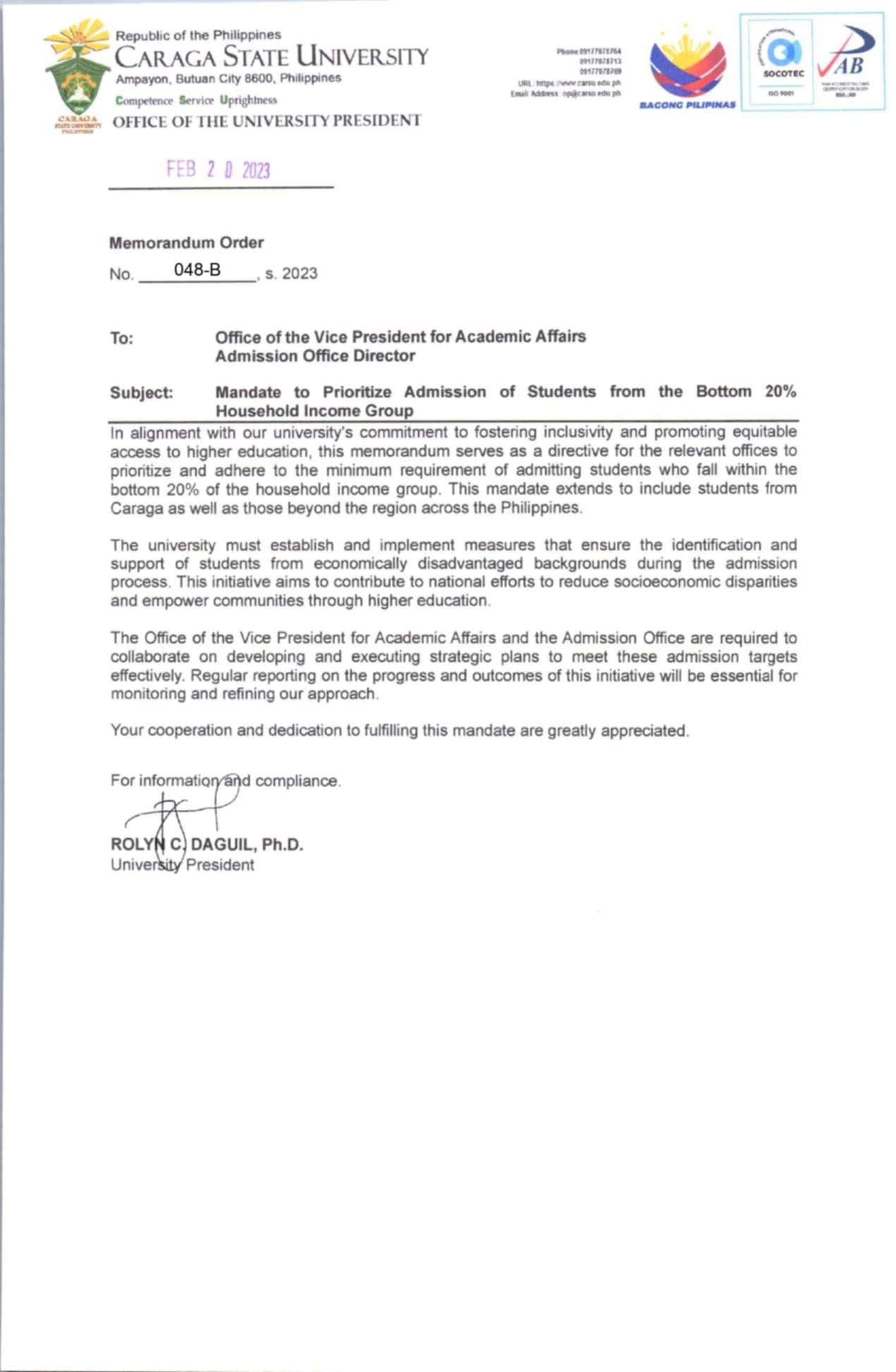
Memorandum Order 048-A - Graduation/Completion Targets for Students in the Bottom 20% Income Group
